On the skids
POLICE HAVE TIGHTENED THEIR GRIP ON HOON DRIVERS, USING INTELLIGENCE TO TRACK DOWN OFFENDERS EVEN AFTER THE ENGINES HAVE COOLED

THE VICTORIA POLICE MAGAZINE AUTUMN/WINTER 2023 PRINT POST APPROVED 100022050
PLUS ONE OFFICER’S JOURNEY FROM BEAUTY THERAPY TO BALLISTICS > BRINGING BABY ZAYDEN’S KILLER TO JUSTICE > KEEPING KIDS SAFE ONLINE AND MORE
Going the distance Making her mark
Community connections are critical for police in the vast Mallee region.

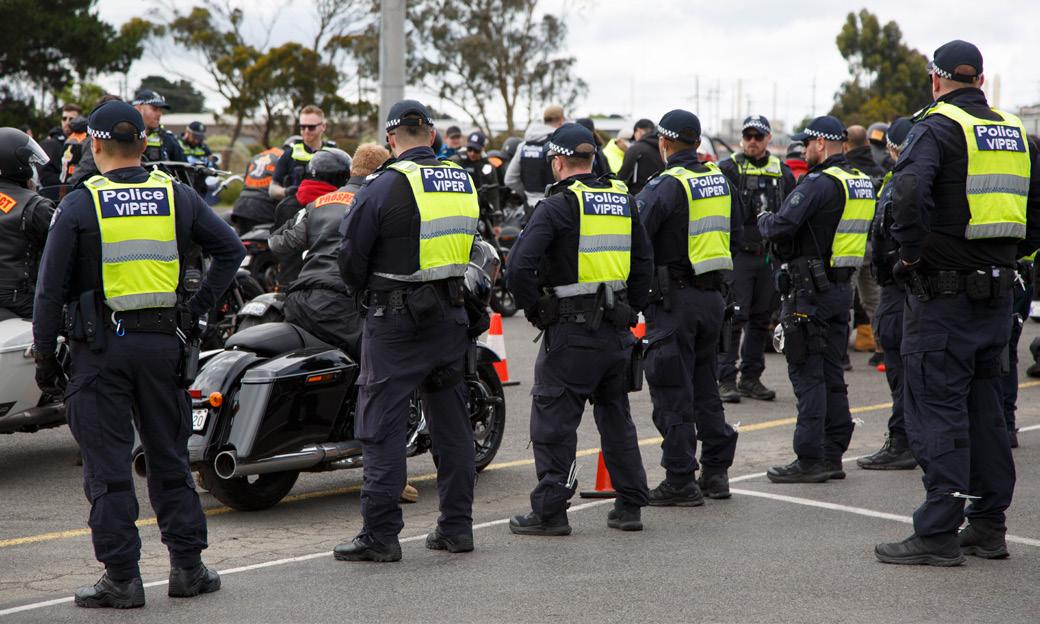
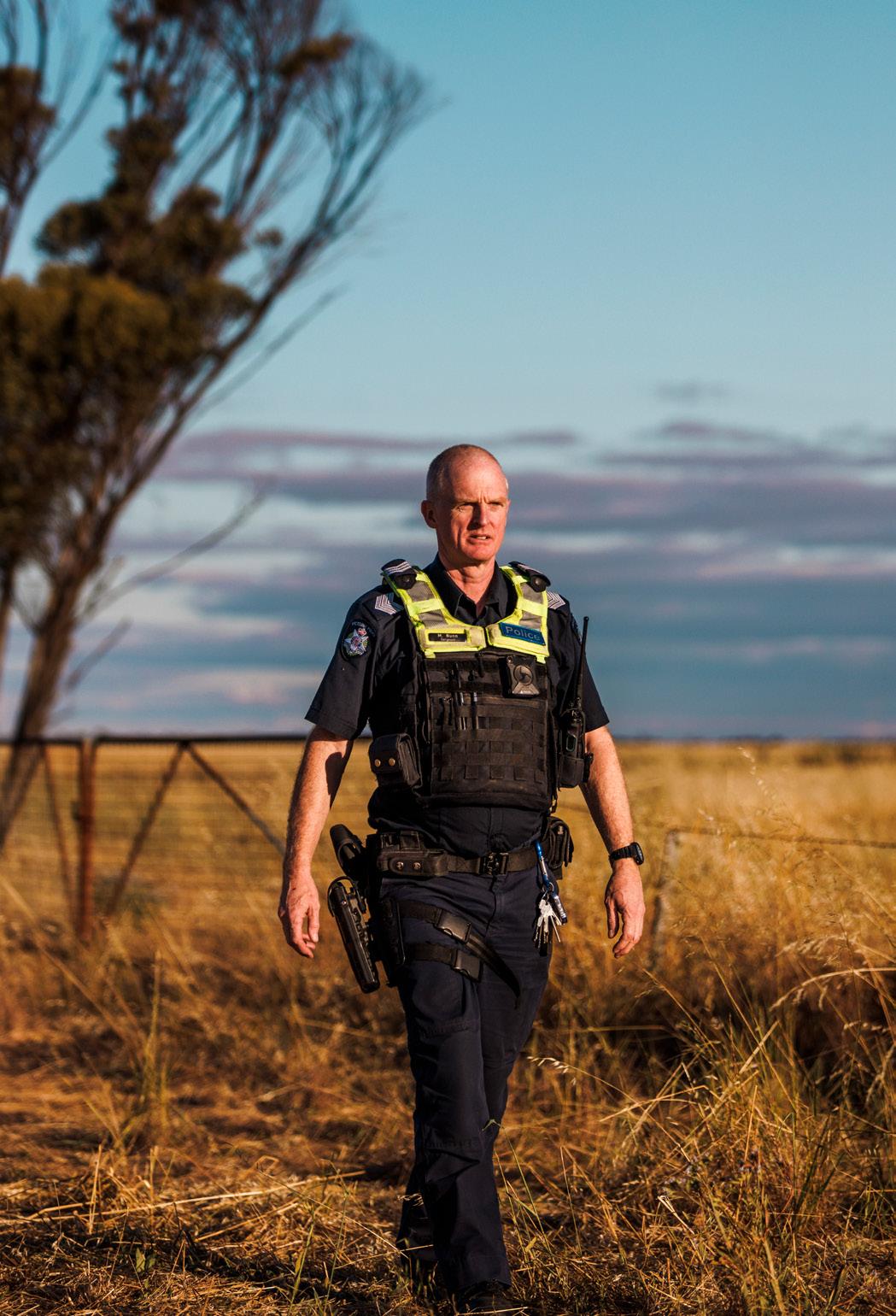
New direction
How two officers discovered they were made for more
Snow school
Police prepare to hit the slopes for another busy winter
Road to recovery
How collision investigators pick up the pieces long after roads have reopened
Doubling the over rate
A side-hustle in international cricket keeps Sen Sgt Phil Gillespie on his toes
Up for the fight NEVER MISS A MOMENT
Cover
A/Insp Darren Kenos, First
Const Dael Darlow, First
Const Matt Parsons, Sen
Const Lachlan Reith and A/ Sgt Adam Mizzi are clamping down on hoon drivers. Full story, Page 8.
Photography Jesse Wray-McCann
Police Life is produced by the Media, Communications and Engagement Department, Victoria Police, GPO Box 913, Melbourne, 3001 Online police.vic.gov.au/policelife facebook.com/victoriapolice twitter.com/victoriapolice
Email policelife-mgr@police.vic. gov.au
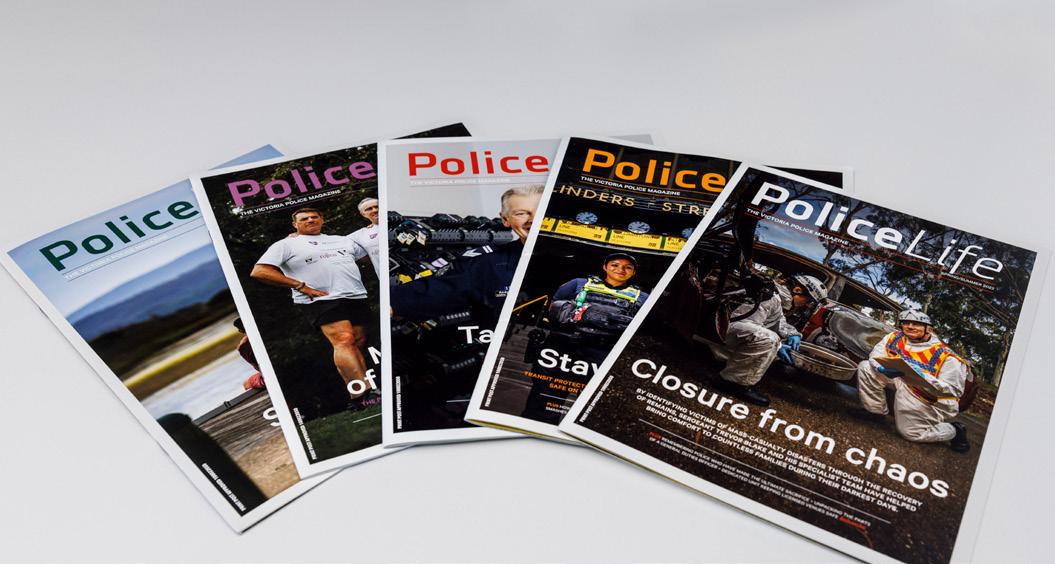
Managing Editor
Beck Angel
Editor
Roslyn Jaguar
Journalists
Danielle Ford
Stephanie McLean
Lane Mihaljevic
Cassandra Stanghi
Emily Wan
Jesse Wray-McCann
Graphic Design Fluid – fluid.com.au
After 40 years, Commander Deb Robertson is still up for the challenge.
6 24 22
VIPER Taskforce turns up the heat on organised crime groups.
AUTUMN/ WINTER 2023
to have Police Life delivered to your email inbox or home free of charge. Visit police.vic.gov.au/police-life-magazine
10 20 30 26 Subscribe
POLICE LIFE | AUTUMN/WINTER 2023 2 C000000
managed forests 100% FSC POSITIONAL ONLY PRINTER TO STRIP IN.
From well-
ON TRACK (AND FIELD) FOR GAMES SUCCESS
The opening ceremony might still be three years away, but Victoria Police is leaving no stone unturned to ensure the 2026 Commonwealth Games is a secure and safe event.
Late last year, the organisation established a Commonwealth Games Command, which will oversee the planning and management of Victoria Police’s safety and security role in the games.
For the first time, the 2026 games will be held in multiple cities: Geelong, Bendigo, Ballarat, Shepparton and Gippsland.
Sporting hubs and athlete’s villages will be set up in all five regions for the 13day sporting bonanza in March, which Commonwealth Games Command Assistant Commissioner Cindy Millen said created some unique policing challenges.
“The logistics of having the five regional hubs will require a risk assessment for each location, which is a more complex project than we’ve done before,” AC Millen said.
“Along with the planning and management at the five regional hubs, significant planning
and management in Melbourne will also be required as the opening ceremony is being held at the MCG.
“Providing security, traffic management and community safety for such a large-scale event across six different hubs, including Melbourne, will require a huge operation from Victoria Police.”

As part of the command’s preparations, representatives took part in a Police Observation Program at the 2022 Birmingham Commonwealth Games, where they were exposed firsthand to the many complexities involved with planning and putting on a games event.
“The last time Victoria Police was involved in a Commonwealth Games event was in 2006 and things have changed quite significantly since then,” AC Millen said.
“With Birmingham being the most recent games, it was a great opportunity to see the logistics involved with putting on an event in contemporary times.”
The games will run from 17-29 March 2026 and the command will continue to recruit
staff from across Victoria Police over the next few years to draw on the extensive and varied expertise of employees.
The Commonwealth Games Command team is also working closely with the Commonwealth Games Federation and the Office of the Commonwealth Games to ensure clarity of roles and responsibilities.
“I’ve spent a lot of my career working in regional Victoria and I know firsthand how great these areas are,” AC Millen said.
“These games are an exciting opportunity for regional Victoria to be showcased on the world stage and our members will play a key part in putting together a safe event for everyone to enjoy.”
Image Winning team
Assistant Commissioner Cindy Millen and Deputy Commissioner Wendy Steendam are leading Victoria Police's planning for the 2026 Commonwealth Games.
Editorial: Danielle Ford
Photography: Jesse Wray-McCann
MAKING NEWS For the latest police news visit police.vic.gov.au/news
3 POLICE LIFE | AUTUMN/WINTER 2023
A MESSAGE FROM THE CHIEF COMMISSIONER
Welcome to the first issue of Police Life for 2023. I hope that, like me, you are looking forward to the year ahead.
You may have seen or heard in the media recently that Victoria Police is in the midst of a recruitment drive.
This might not come as a surprise, but I consider policing to be the best job in the world. A career with Victoria Police opens doors to so many different roles. You could be a detective, a prosecutor or a negotiator.
You could help victims of family violence, you could keep our roads safe as a member of Highway Patrol, or play a key role in tackling crime and safety issues in your local community. And there’s no better time than now to join our policing family.
This edition of Police Life features the stories of two of our members who pursued very different career pathways before joining Victoria Police –one worked in beauty therapy, the other in mining. Their stories demonstrate that our workforce – whether it be our police, our Victorian Public Service employees, our protective services officers or police custody officers – come from all walks of life.
The diversity of experience within our workforce is highly valued and is critical to our delivery of a safe Victoria.
The fascinating and varied work that our people undertake is also featured in this edition. This includes the work of the Major Collision Investigation Unit, which goes beyond the investigation at the roadside to include support for the families of collision victims through the investigation and court processes.
The success of Taskforce Achilles in clamping down on hoon drivers is also highlighted. The taskforce’s members, many of them former mechanics, are relentless in their pursuit of hoon drivers.
In the 2021-2022 financial year, Achilles charged 240 offenders, impounded 155 vehicles and issued 766 fines.
Finally, the varied and rewarding work of our regional frontline police is captured in the story on Buloke Shire, where 10 police officers work across six police stations, covering 8000 square kilometres.

With 6200 residents, the Buloke Shire population is widely dispersed, but the local police pride themselves on being deeply embedded in their community.
Being visible and accessible to community members – and listening to their concerns – is something I am passionate about, so it’s great to see that in practice in Buloke.
There’s no doubt that working with Victoria Police offers more variety, more challenges and more purpose.

And that’s the crux of our recruitment campaign, “Made for More”, which features one of our very own senior constables at the front and centre of our advertising (pictured below).
If you are looking for something more, I invite you to apply to join us. An extraordinary career awaits. Stay safe.
Chief Commissioner Shane Patton
Keep up with the latest news from Victoria Police POLICE LIFE | AUTUMN/WINTER 2023 4
"The diversity of experience within our workforce is highly valued and is critical to our delivery of a safe Victoria."
I joined when I was 30 and in all honesty, I needed something to challenge me while providing stability for my family. After running my own business, I couldn’t remember when I had last had more than a few days off at once.
My father’s side of the family has a history working in the armed forces, so I’ve always been drawn to helping protect the community. Policing was a good fit for me as it was protection and enforcement at a local level where I felt I could make a difference.

Before migrating to Australia, I served for five years in the police force in Mauritius. After I became a permanent resident, I applied to join Victoria Police and became a police custody officer in 2017. The role gives me the chance to work with people of different cultural backgrounds every day.
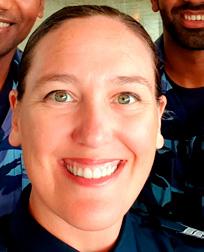
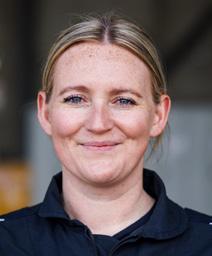
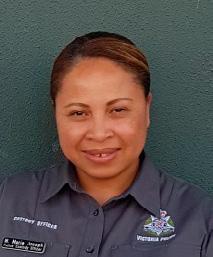
I was 18 and wanted to be a firefighter, but the age limit was 21. So the next option was the police force. It was just going to be an interim job, but with the experiences I’ve had and the work I get to do, I’ve never looked back.
WHAT PROMPTED YOU TO JOIN VICTORIA POLICE?
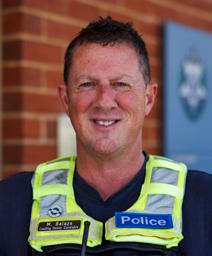
To be really honest, I’ve been in the job for so long that I can’t remember what made me want to join.
Growing up in the country, I’ve known a lot of people who have been affected by speeders and drink-drivers. I joined to work in Highway Patrol and catch offenders.
I was looking for a career that matched my character and lifestyle. Being physically active as a person and active in the community is important to me, as well as the work/life balance that it offers.
I've always been very interested in research and forensic science and majored in molecular biology at university. I was then able to join the Forensic Services Department where I can use my training as a Forensic Biologist to have an impact in making the community safer.

I started my career in policing in Queensland and I joined because my older brother had joined when I was 11 years old, and he is someone I have always looked up to. After moving to Victoria in 2019 I quickly realised I missed being a police officer.
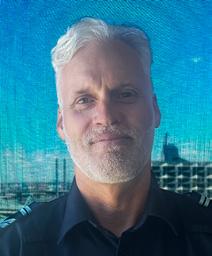
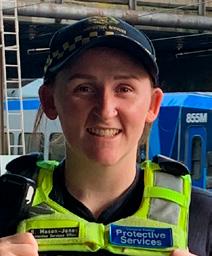
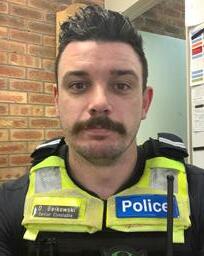
Joining Victoria Police was my childhood dream and it hasn’t disappointed. I saw it as an exciting opportunity and a lifestyle choice outside the traditional 9-5. I have experienced a variety of career paths within Victoria Police and I know I have job security.
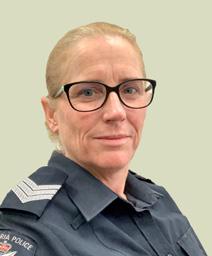
VOX POPS
ACTING SERGEANT
LEADING SENIOR CONSTABLE MICK BALAZS Bridgewater Police Station PCO MICHAELA MARIEJOSEPH Heidelberg Police Station SENIOR CONSTABLE DAN GEIKOWSKI Orbost Highway Patrol SENIOR CONSTABLE BRITTANY SMITH Tactical Flight Officer, Air Wing
JAKKI POUSTIE Northcote Police Station PSO FIRST CLASS BETH MASON-JONES Transit Central
FORENSIC OFFICER TOM NGUYEN Biological Sciences Group
TACTICAL OFFICER Special Operations Group
SERGEANT MELANIE CASTLES-MCKEOWN Road Policing Drug and Alcohol Section
5 POLICE LIFE | AUTUMN/WINTER 2023
LEADING SENIOR CONSTABLE MICHAEL DEVERALL State Event Planning Unit
LONG DISTANCE RELATIONSHIPS
When a 200-kilometre drive from one end of your policing patch to the other is the same distance as travelling a quarter of the way across Victoria, it pays to be close to your community and your colleagues.
The 10 police officers across six stations –Donald, Charlton, Wycheproof, Culgoa, Sea Lake and Birchip – that make up the Buloke Shire cluster make it their mission to keep connected with everyone around them.
At 8000 square kilometres, the massive Buloke Shire – which straddles the Mallee and the Wimmera regions in the state’s northwest – is the fifth largest of Victoria’s 79 local government areas.
It is home to almost 6200 people, making it one of the state’s most spread-out populations, and is known for its sprawling wheat fields and sheep farms.
Sergeant Martin Nunn, the officer in charge at Donald, is determined for it also to be known for police officers who are deeply embedded in their communities.
Sgt Nunn originally hails from England, where he worked as a police officer in a specialised team responsible for working with the community to decide policing priorities and find long-term solutions to local problems.
The first thing that struck him when he started working in the Buloke area more than a year ago was the vastness of the patch. The second was its potential for the kind of policing he used to do.
“I’m really passionate about the neighbourhood policing initiative Victoria Police is now using because it’s what I love about policing,” Sgt Nunn said.

“We’re working very closely with our local people, businesses, organisations and support agencies in a comprehensive and grassroots way, where policing is just one of the levers we can pull to make the place safer for everyone.”
Sgt Nunn and his fellow Donald officers Leading Senior Constable Mark Connell and First
Constable Marcel Podasca have built a special relationship with the schools in their town. Their connection with the staff and students helps get ahead of any future problems.
Late last year, teachers at Donald High School became aware of students talking about firearms.
The school’s principal Paul Aikman asked Sgt Nunn to chat to the students.
“I told the students that they may actually be committing an offence if people around them felt threatened by them talking about shooting firearms and hurting people,” Sgt Nunn said.
“I said, ‘You’ve got your whole lives ahead of you and I don’t want you to ruin it with something like this’.
“Opportunities like that are important for us because the kids now know who we are and feel comfortable to approach us when they see us out and about.
“That’s what I want, for people to know our team is approachable.”

01 01 POLICE LIFE | AUTUMN/WINTER 2023 6
Mr Aikman said the students, teachers and wider school community benefitted from the great relationship with police.
“It has been great having them as a presence here to be stern when they need to be but also in a way that the kids feel safer to see them around the town,” Mr Aikman said.
“We as a school love working with them as part of being a strong community here.”
Along with working as a police officer in Donald for 20 years, Ldg Sen Const Connell runs the local Auskick centre, has been president of local schools and more.
“I would first see people here as little kids at Auskick, then as students in high school, and now I see them again at the pubs and driving around,” Ldg Sen Const Connell said. It is these kinds of connections that can prove pivotal in combatting crime.
“One time I was talking with someone and they brought up that they had seen a black BMW driving up and down a dirt road just out of town and it seemed kind of out of place,” Ldg Sen Const Connell said.
“We went to the address out there and found a stolen trailer, so I started having more of a look around.
“There was a tiny outdoor shed and when I opened it up, I noticed a small trapdoor in the floor.

“As soon as I opened the trapdoor, a great, big burst of light came out from underneath.
“It turned out there was a full hydroponic marijuana setup in a secret underground tank below the shed.
“That’s how we solve crimes, with the help of the community.”
Sgt Nigel MacDonald has been at Charlton for 32 years and said that despite the tiny size of each of the towns in the area, they aren’t untouched by the scourge of drugs.
“There has always been a bit of marijuana about, but in recent years we’ve seen harder drugs creeping in more,” Sgt MacDonald said.
On the day Police Life visited the area, Sgt MacDonald responded to a report of a drug overdose in town and worked with paramedics to successfully save the man’s life.
It was an incident for which Sgt Nunn, who was due to finish working for the day, rushed the 40km from Donald to Charlton to assist his colleague.
It’s the kind of backup Buloke officers are always quick to offer one another.

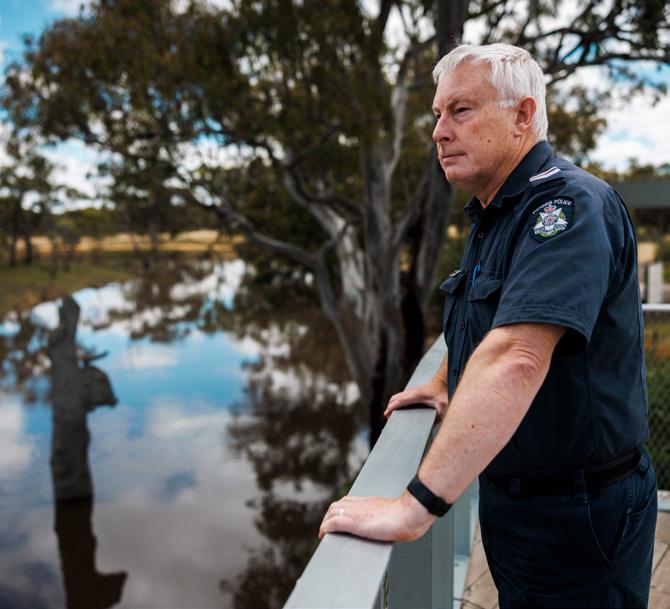
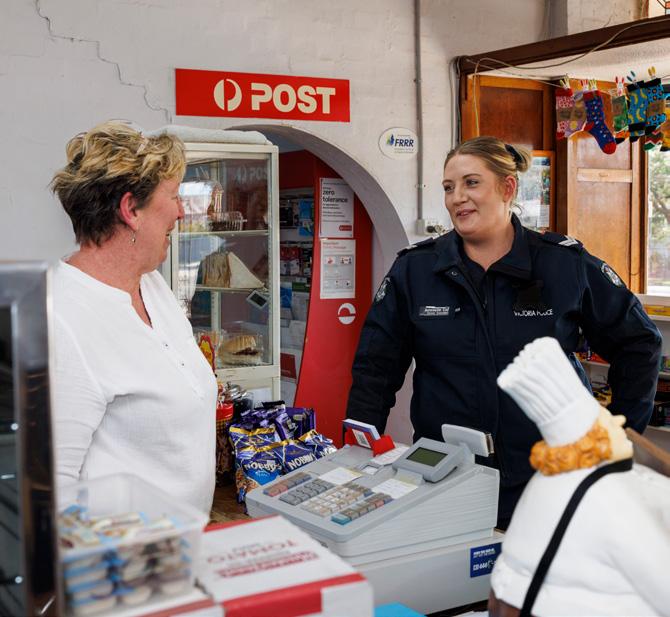
Despite the distances between them, they’re a tight-knit group.
It also means they spend a lot of their time on the road, which has a positive impact on traffic incidents.
Ldg Sen Const Darin Sheahan is the police officer at Wycheproof – one of four onemember stations in the cluster – and said focusing on the roads is always a major theme in country policing.
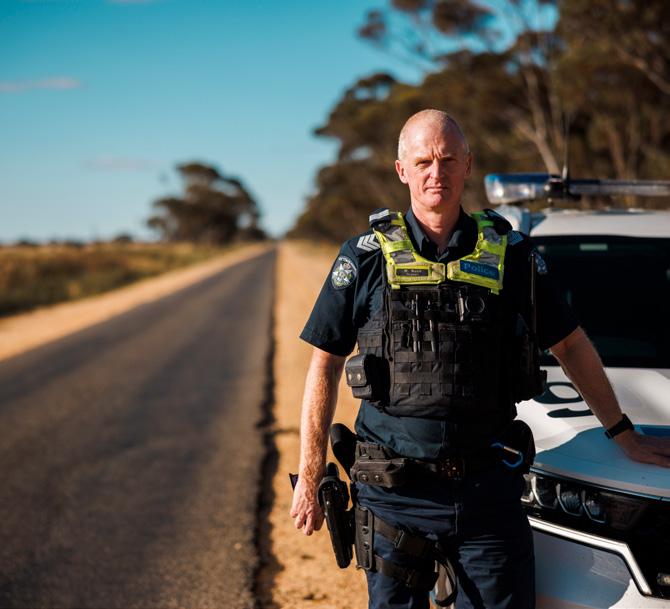
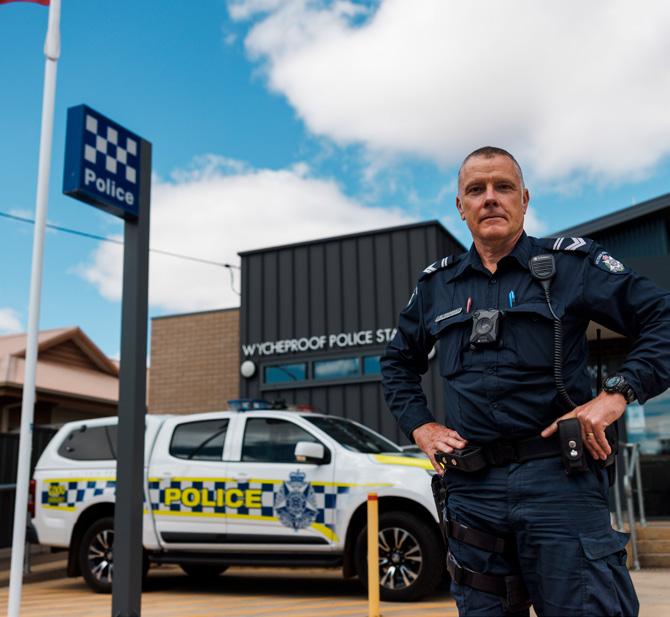
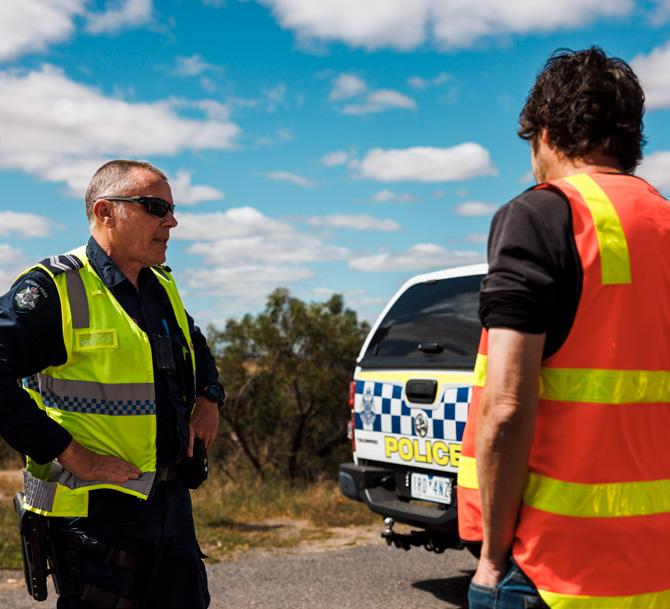
“Even though we’re a small town, we’ve got the Calder Highway running straight through the middle and we can get a lot of visitors here on the weekends,” Ldg Sen Const Sheahan said. “Especially on long weekends, traffic in Wyche can look like Springvale Road.”
Sgt Nunn said people in the area know not to speed on the roads because they always see police out and about.
“That is what policing is all about – we’re making a difference for the people we look after, and that’s exactly why I got into the job to begin with.”
Ldg Sen Const Darin Sheahan has a strong focus on road safety at Wycheproof.
The Buloke cluster straddles the Wimmera and Mallee regions in cropping and sheep country.
Ldg Sen Const Sheahan speaks with a local atop Mt Wycheproof.
Sen Const Annie Coobs is the sole officer at Culgoa, one of four one-member stations in the cluster.
Sgt Martin Nunn, at Donald, is a long way from his policing roots in England.
Ldg Sen Const Mark Connell is part of the furniture at Charlton, where he has been stationed for 32 years.
Image Care in a crisis 01 Sgt Nigel MacDonald and Sgt Martin Nunn speak with a community member after responding to a drug overdose at Charlton.
7 POLICE LIFE | AUTUMN/WINTER 2023
Editorial and photography: Jesse Wray-McCann
PUTTING THE BRAKES ON HOONS
A car with a loud V8 engine rumbles by and a group of men all turn to check it out.
But these are not your usual blokes who cannot help but rubberneck whenever a hotted-up car rolls down the street, these are police officers who specialise in cracking down on hoon driving.
These are members of the incredibly successful Taskforce Achilles, responsible for hundreds of hoons being charged and cars impounded.
As they watch the car drive along, A/Sgt Adam Mizzi reads out the numberplate.
“Hmm, I reckon that’s the car I spoke to on Boundary Road on Tuesday night,” A/Sgt Mizzi says.
He and his colleagues remember a numberplate – and even stickers and small dents – the way the average person remembers a face.
It’s a moment that’s indicative of the specialised skills the Taskforce Achilles members have honed as they relentlessly clamp down on Melbourne and Victoria’s hoon driving scene.
Achilles began in July 2021 as an operation, but its remarkable success in holding hoon drivers to account has resulted in it being extended now as an ongoing taskforce.
Acting Senior Sergeant Simon Borg, who heads up the northern and western suburbs part of the taskforce, said their mission to stop the prolific and dangerous hoon events was a challenging one.
At its peak in the North West Metro Region, there were about 35 hoon events per month, sometimes attracting huge crowds of about 150 cars and up to 400 spectators.
But after more than 18 months of the Taskforce Achilles crackdown, there is now an average of barely one small event per month.
A/Sen Sgt Borg said police and the community were not only fed up with the sheer size and frequency of the events, but the danger they posed.
“Because of the numbers at these high-risk driving (HRD) events, the mob mentality

kicked in and they were very brazen,” A/Sen Sgt Borg said.
“They would openly attack police vehicles and would message amongst themselves to tell each other to block the cops.”
Often when police would break up an event, the hoons and spectators would immediately set up in another location and it was the travelling between events that posed the greatest danger to the public.
“When you've got everyday people doing the legal 100km/h on the freeway and you've got some lunatic barrelling past you at 200km/h, it can be incredibly scary,” A/Sen Sgt Borg said.
“On one occasion, there was a car that had left an HRD event and was driving at speed and quite erratically.
“A police unit that didn’t know about the HRD event attempted to intercept it but the vehicle accelerated, ran a red light and t-boned another vehicle, seriously injuring the driver of that other vehicle and the passenger of the offending
01 POLICE LIFE | AUTUMN/WINTER 2023 8
vehicle, who was thrown out of the car and ended up with critical injuries.
“It was a direct result of leaving an HRD event to get to another one quickly and it was quite simply a miracle that nobody was killed.”
Just disrupting hoon meets was only so effective, so Taskforce Achilles adopted a robust investigative approach to hunt down offending drivers after the fact.
“I think some of them were shocked when we came knocking on their door, because they thought they had to be caught on the night to be charged,” A/Sen Sgt Borg said.
“These are not just traffic offences – they are high-level, dangerous behaviours that fall into the realm of criminality and need to be treated accordingly.”
Achilles officers use a raft of secret, intelligence-led strategies to identify and track down offenders, but the photos and videos from the hoons’ own public social media accounts make it easy for police.
“These guys are just peacocks and want to show off their feathers, which is very helpful for us,” A/Sen Sgt Borg said.
“If they stop using social media, then they no longer have any motivation to do it.”
Another effective measure has been to involve the drivers’ parents.
Acting Inspector Darren Kenos said it is not uncommon for the cars detected at HRD meets to be registered to the parents of the hoon driver or spectator.

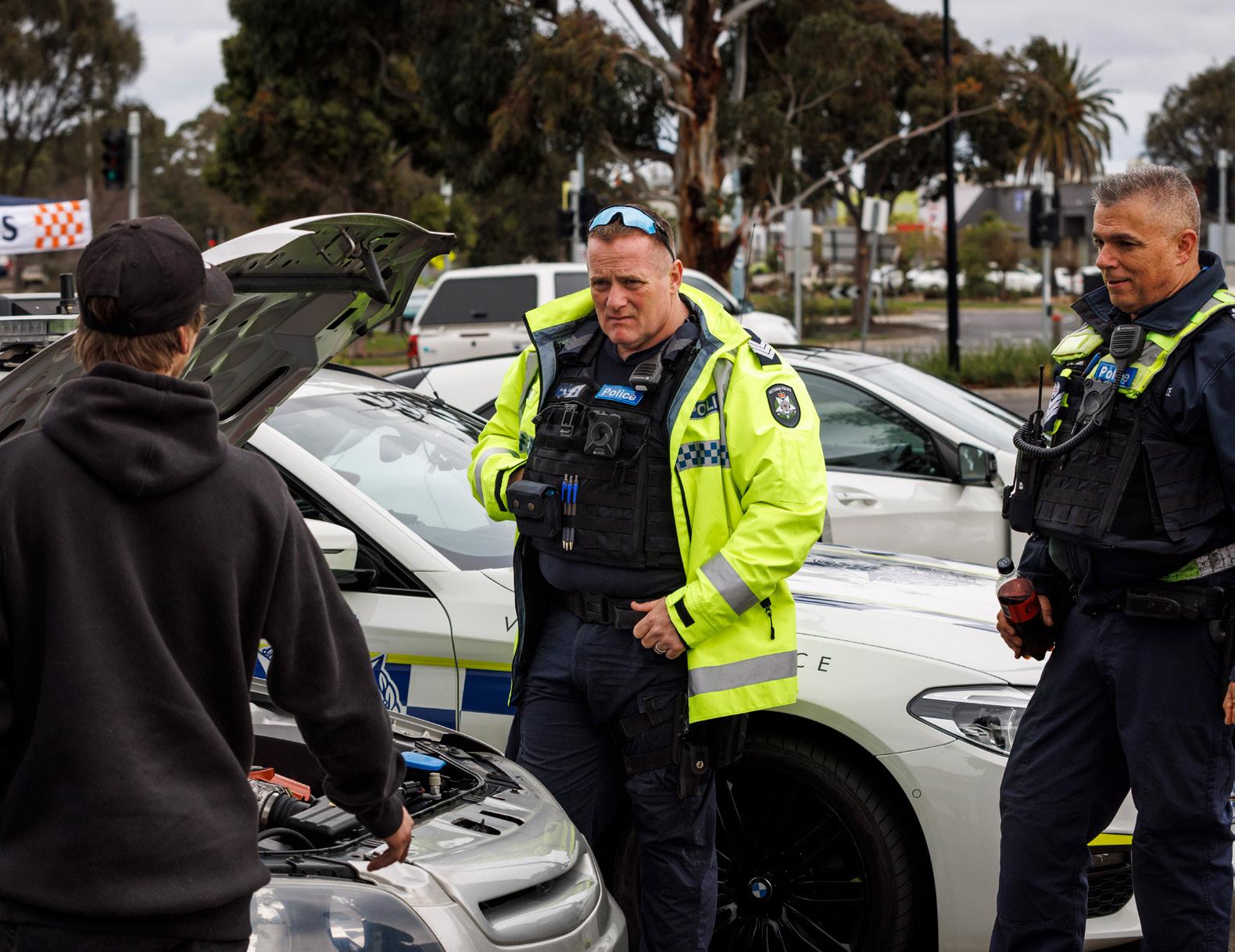
“One of the biggest non-enforcement deterrents we have is the parents becoming aware of what their kids getting are up to at night,” A/Insp Kenos said.
“I would love to be a fly on the wall in some of those conversations between parent and kid, because we often don’t see them at HRD events again.”
It’s not just the drivers that police take off the roads but their cars, too.
Hoon driving takes its toll on their cars, which A/Insp Kenos says often aren’t looked after in the first place.
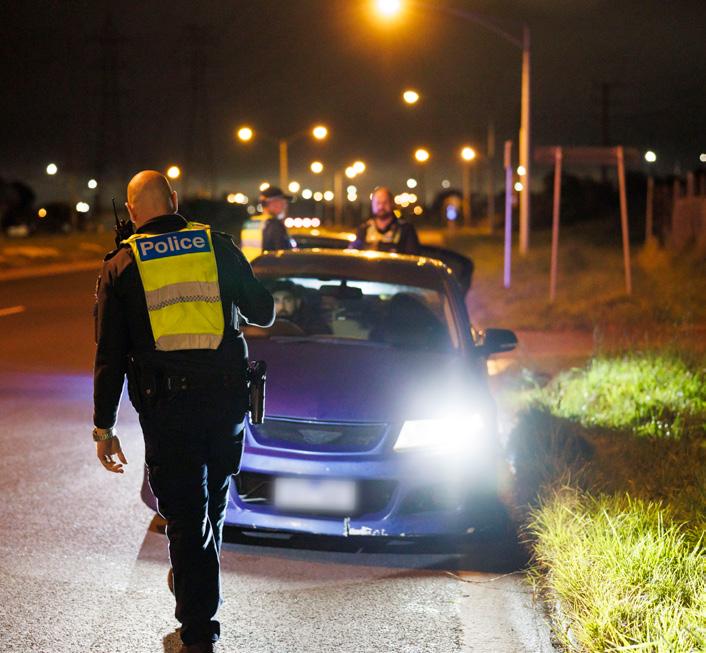
Inspecting cars and issuing defect notices is a big part of the work Taskforce Achilles does and they’re very effective at it, with many of the team’s officers being former mechanics.
“As much as they try to pull the wool over our eyes to avoid a defect notice, they can’t slip too much past our officers,” A/Insp Kenos said. And the eagle eye of Achilles members extends beyond conspicuous cars, according to A/Sen Sgt Borg.
“We once identified an offender from a blurry video because we were already familiar with the way he walked,” he said.
The near-inescapable presence of Achilles has led to many hoon drivers on their social media accounts using less-thancomplimentary hashtags involving A/Sen Sgt Borg and A/Sgt Mizzi.
The assumption among many now is that their social media is always monitored, so #Mizziiswatching is one of the more recent hashtags being used.
The officers don’t mind because the notoriety works in their favour, both in terms of deterrence and in catching offenders.
“The feedback we’ve received from the communities affected by HRD events has been hugely positive and it spurs us on to keep them safe,” A/Sen Sgt Borg said. However, perhaps not everyone appreciates the crackdown.
“Some of these guys would go through a set of tyres every two days, so I’m sure there are a few tyre places wondering why they’ve had such a downturn in business,” he said.
Images Hoon hunters
01 First Const Matt Parsons issues a defect notice.
02 Sgt Andy Oakley and A/Sen Sgt Simon Borg speak to a car owner over the state of his vehicle.
03 Many Taskforce Achilles officers have a background as mechanics and are experts at spotting unsafe cars.
04 Taking dangerous drivers and their cars off the road is a priority for Taskforce Achilles.
02
Taskforce Achilles achievements in 2021-2022 financial year Offenders charged 240 Charges laid 1352 Vehicles impounded 155 Search warrants executed 48 Fines issued 766 Unroadworthy notices 144 03 04 9 POLICE LIFE | AUTUMN/WINTER 2023
Editorial and photography: Jesse Wray-McCann
NUMBERS GAME
Taking aim at a new career
Fresh out of high school, New Zealandborn Leading Senior Constable Lisa Atkinson set her sights on becoming a full-time beauty therapist.

But after crossing the ditch to Australia, she quickly realised that massage and hair removal wasn’t her “forever career”.
“I completed my studies in holistic beauty therapy at the Auckland University of Technology when I was 21,” Ldg Sen Const Atkinson said.
“I received the training needed to work in the industry, but also learnt about anatomy and physiology alongside trainee paramedics and nurses, so it was a bit more than your average beauty course.”
After graduating from university, Ldg Sen Const Atkinson spent 12 months working at a day spa, just a 15-minute commute from her home in Nelson on New Zealand’s South Island. She then moved to Christchurch to try her hand at something totally new.
“I started racetrack riding in 2003, working with a stable to prepare their horses for races,” Ldg Sen Const Atkinson said.
“I liked the work,” she said, “but the money was terrible and so was the weather.”
A year later, in search of sunnier skies and a new start, Ldg Sen Const Atkinson packed her bags and bought a one-way ticket to Melbourne.
“I landed with just $200 in my wallet – and my riding boots,” she said.
“I was bored with beauty therapy, so wanted to continue working with horses. I had a job lined up at Caulfield Racecourse and everything, but it didn’t work out, so I ended up getting a mechanic apprenticeship instead.”
While going from one role to another suited Ldg Sen Const Atkinson’s lifestyle for a while, things changed when she had her first child at the age of 25.
“I never wanted to be a stay-at-home Mum, it just wasn’t for me,” she said.
“That was when I saw a police recruitment ad and thought ‘this gig looks good – I reckon I could do that.’”
POLICE LIFE | AUTUMN/WINTER 2023 10
On a mission to reboot her career, Ldg Sen Const Atkinson applied to join the force in 2009 and was accepted into the Academy when her second child was just 13 months old. After graduating, she started work at Dandenong Police Station, then transferred to Cranbourne where she stayed for “quite a while”.
“I just loved the area – there was always work to be done and I was never bored.”
During her time as a general duties police officer, Ldg Sen Const Atkinson had the opportunity to upgrade to the role of sergeant, taking on more responsibility in the station.
She also undertook secondments with the Dandenong Safe Suburbs Tasking Unit and Casey Family Violence Investigation Unit, opportunities she feels were key to broadening her knowledge of policing.
“Secondments are fantastic,” she said. “While they’re only short, they allow you to branch out and try something completely different.”
After getting a taste of what it’s like to work in a specialist unit, Ldg Sen Const Atkinson decided it was time to explore what else the force had to offer.
“Being a horsey person, I always thought I’d end up in the Mounted Branch,” she said, “but then a role in ballistics came up.
“I had an interest in firearms and thought it sounded like a great opportunity, so I went for it and haven’t looked back.”
The Victoria Police Ballistics Unit examines and identifies firearms, ammunition, fired bullets, fired cartridge cases and toolmark damage – a field of policing Ldg Sen Const Atkinson couldn’t wait to dive into.

The unit also attends and examines crime scenes, from drive-by shootings to homicides.
“I absolutely love it,” she said.
“There’s plenty of casework to do, so it’s always pretty busy.
“The job also provides me with the flexibility to be around for my kids, which is exactly what I was looking for.”
Because she’s always up for a challenge, Ldg Sen Const Atkinson is even completing further study alongside her day-to-day duties.
“I’m currently doing my Advanced Diploma of Forensic Investigation, and down the track will complete a Graduate Certificate in Forensic Firearm Examination,” she said.
One day, Ldg Sen Const Atkinson hopes to reach “expert level”.
“The road to get there is a long one, but it means you can be an expert witness in court,” she said.
“It’s the end-game, really.”
Drawing on her own career journey, Ldg Sen Const Atkinson’s advice to anyone thinking about joining the force is to make the most of the opportunities available.
“There’s just so much you can do at Victoria Police, so much you haven’t even thought about,” she said.
“Once you do a few years of general duties, think about what interests you and go explore.
“I never thought I would work in ballistics— I never thought I was smart enough—but here I am today.”
Images Forging a new path
Ldg Sen Const Lisa Atkinson is glad she took the leap from her previous roles into policing.
Editorial: Lane Mihaljevic
Photography: Jesse Wray-McCann
Are you made for more?

Are you looking for a career where you can reach your potential and make a difference?
Ever get the feeling you could be made for more?
Victoria Police is recruiting now for an additional 502 police officers to meet the growing needs of the community.
A career with Victoria Police is made for ambitious people looking for more challenges, more purpose and more possibilities.
The majority of Victoria Police members work as general duties police officers, who are the first to respond when community needs arise, 24 hours a day, seven days a week.
You could be part of the team that makes a difference to the Victorian community every day.
If you’re made for more, apply now. Visit police.vic.gov.au/police
11 POLICE LIFE | AUTUMN/WINTER 2023
Mining his opportunities
Acting Senior Sergeant Julian Tang can’t help but laugh when he thinks about how differently his career could have turned out. Despite studying business at university and pursuing basic training in the Australian Army Reserve, policing was always on his mind. Being part of the Army Reserve put him in contact with Victoria Police officers who also serve in the Australian Defence Force (ADF) and provided him a chance to start asking questions about a policing career.
When weighing up whether to join the ADF full time, a fellow Army Reservist and Victoria Police officer had some pointed words for A/Sen Sgt Tang.
He remembers the officer saying “Why would you do that? You only really get deployed by the Army when there's either a natural disaster or a wartime situation, whereas if you join Victoria Police your abilities get tested every day”.
But it wasn’t meant to be at that point. With a business degree in supply chain and logistics, he accepted a prestigious place in mining giant Orica’s graduate program.
But after seven years working for Orica, he began to ask himself “is there a job out there that better aligns with my personal values and where I can do more good?”.
Also on the cards was a move to Orica’s head office in Singapore, which didn’t hold much appeal.
He decided it was time to go in search of a more fulfilling, community-minded career.
“As an Army Reservist I had the chance to work side-by-side with Victoria Police during the 2009 Victorian Bushfire relief efforts and observe the impact the organisation has on the community,” A/Sen Sgt Tang said.
He recalls when he and a senior constable were patrolling Strathewen and came across a farmer overlooking his burnt property.
“Clearly distraught, the farmer could barely muster the request ‘Can I get an excavator or a digger so I can bury livestock?’ when he proceeded to break down,”
A/Sen Sgt Tang said.
“Without any hesitation, the senior constable pulled him in for a hug. It was very powerful.”
A/Sen Sgt Tang started his deployments at Fawkner and Brunswick police stations doing general duties.
It wasn’t long before the Officer in Charge at Brunswick noticed A/Sen Sgt Tang was good with data, so in 2019 he was given an opportunity in the Fawkner Divisional Intelligence Unit.
A move to Hume later that year was next for A/Sen Sgt Tang, whose “natural evolution” was to work as a Tactical Intelligence Officer. Since then, he has held roles in the Sexual Offences and Child Abuse Investigation Team, tasking operations and as a frontline sergeant at Moonee Ponds.
A/Sen Sgt Tang said one of his greatest fears is to pigeonhole himself too much because he might miss out on other opportunities.
In his current upgraded role, he is back in the intelligence area working with specialised squads to disrupt organised crime groups. As to where he heads next, he’s not quite sure.
“That’s the magic of this organisation, there's so many areas you can explore.”

Image Pursuing his passion
A/Sen Sgt Julian Tang opted for a communityfocused policing career over opportunities with the Australian Defence Force and Orica.

Editorial: Emily Wan
Photography: Stephanie Clark
POLICE LIFE | AUTUMN/WINTER 2023 12
VICTORIA POLICE BY THE NUMBERS:
80
is the value of the cheque that Chief Commissioner Shane Patton presented to Special Olympics Victoria on behalf of Victoria Police during the 2022 Law Enforcement Torch Run.
is the total number of aircraft in the Victoria Police fleet, including one aeroplane, three helicopters and 76 drones.
21,938 10
is the number of police officers working across the Buloke Police Service Area. Read about these officers’ mission to keep connected with their community and colleagues on Page 6.
is the number of police officers, protective services officers, police custody officers, Victorian Public Service employees and reservists employed by Victoria Police as at the release of the organisation’s Annual Report 21-22.
20 9 5
is the year Senior Sergeant Phil Gillespie became a cricket umpire. Read about how he juggles his passion for both sport and policing on Page 30.
is the number of regional cities that will be hosting events during the 2026 Commonwealth Games. Read about how Victoria Police is preparing for the 13-day sporting bonanza on Page 3.
1.3 METRES 2 MINUTES
is the obstacle height that applicants must climb to be able to join Victoria Police as a frontline member. Find out more about the fitness testing and recruitment process at police.vic.gov.au/ police-recruitment-process.
is all it takes to subscribe to have Police Life delivered to your email inbox or home free of charge. Visit police.vic.gov.au/ police-life-magazine to do so.
13 POLICE LIFE | AUTUMN/WINTER 2023
Sextortion scam targets teens
A 14-year-old boy, Jack*, is messaged by a woman named Sandra Kate on Instagram and begins engaging in general conversation.
After a bit of casual back and forth, the conversation turns sexual, and Sandra Kate encourages Jack to move the chat to another platform so they can exchange explicit images.
After receiving a nude image of Sandra Kate, he sends back an intimate image, unaware the person he is communicating with isn’t really Sandra Kate.
Now with this intimate image, the person posing as ‘Sandra Kate’ responds with a threat: transfer $300 to a nominated bank account or the image will be sent to his entire social network.
When he doesn’t respond, ‘Sandra Kate’ escalates her threats by sending screenshots of the list of Jack’s friends she says she will send the image to if the money isn’t paid.
It’s a distressing situation this young boy finds himself in, but unfortunately he’s far from alone in getting tangled in this web of lies.
Detectives from the Victorian Joint Anti Child Exploitation Team (JACET) – which is
comprised of both Victoria Police and Australian Federal Police (AFP) investigators – say more than 700 incidents that may be linked to this type of offending were reported in the six months to the end of last year.
Commonly referred to as ‘sextortion’, these offences generally involve offenders coercing children, particularly teenage males, into producing explicit images before extorting them for money, gift cards or cryptocurrency.
“This is really a serious and concerning trend that we’re seeing globally at the moment,” JACET Detective Acting Inspector Carla McIntyre said.
Police are urging parents and children across the state to openly discuss online safety.
“If you are a parent, aunty, uncle, grandparent or someone a young person trusts – please have the brave conversation with them about their online safety and this type of offending,” Det A/Insp McIntyre said.

“Let them know they can talk to you and that if this does happen to them, it is not their fault, and it is absolutely nothing to feel embarrassed about.
“There is a wide range of useful information available to help people understand sextortion so they are aware of the warning signs, can keep themselves safe and know what to do if they experience it.”
The advice for anyone targeted by sextortion is to not make any payments and instead make a report to authorities as well as the social media platform the contact was made on
“We believe these matters are under-reported, which can be for a range of reasons, including fear or embarrassment, and sometimes feeling unsure if an offence has occurred or if they will be believed,” Det A/Insp McIntyre said.
“In Jack’s case, he didn’t initially report to police or even tell his family due to embarrassment.
“When he did eventually report it, police were able to provide support, reassurance and referral advice to help him manage the situation.”
Sextortion offences can be reported online through either the Australian Centre to Counter Child Exploitation (ACCCE) if the victim is under 18, or through government cyber security website ReportCyber if the victim is an adult.
POLICE LIFE | AUTUMN/WINTER 2023 14
However, Det A/Insp McIntyre said people are also encouraged to report any offences directly to police.
“Victoria Police is committed to investigating these matters and holding offenders to account, so if you, your child, or anyone you know is subject to any type of concerning behaviour like this online, we would urge you to contact police and discuss the circumstances with us,” Det A/Insp McIntyre said.
“Anyone who contacts us will be supported and treated with respect, courtesy and dignity.”
*Not his real name
Image Cyber con
Children, particularly young males, have been the main targets in the recent spate of ‘sextortion’ scams.

Editorial: Danielle Ford
WHAT IS SEXTORTION?
Sextortion is a form of online blackmail where someone tricks or coerces you into sending your sexual images then threatens to share them unless their demands are met.
DO stop the chat take screenshots of the text and profile block the account and report it to the platform make a report get support
DON'T send more images pay or send gift cards respond to demands enter into further communication think you’re alone
For more information and access to tools, resources and advice, visit esafety.gov. au or cyber.gov.au/acsc/report
Source: AFP and ACCCE
15 POLICE LIFE | AUTUMN/WINTER 2023


TRUE CRIME POLICE LIFE | AUTUMN/WINTER 2023 16
“We needed a plausible break and not this fanciful one where a burglar had murdered a baby.”
Can a burglar be a murderer?
CONTENT WARNING
This article contains information about the death of an infant. Reader discretion is advised.
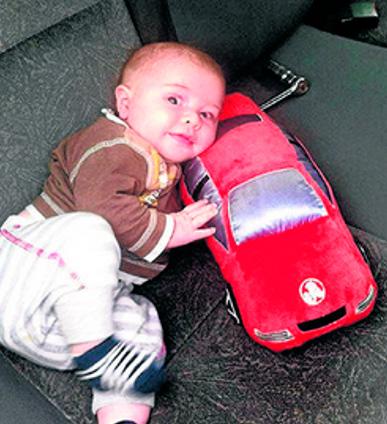
It’s about 7am on 15 June 2012 and threeyear-old Xavier Veal-Whitting has awoken to find the front and back doors of his family’s Long Gully home in Bendigo are wide open.
Little Xavier goes into his mother Casey Veal’s bedroom where she is sleeping with her boyfriend of eight months Matthew Tisell.
“Doors open. Doors open,” Xavier says. Casey checks the house, including peeking into the bedroom of her 10-month-old son Zayden Veal-Whitting where he seems to still be sleeping in his cot.
She soon discovers her and Matthew’s wallets are missing and their cars parked outside have been rifled through, so she phones Triple 0.
At about 7.30am she goes into Zayden’s bedroom and notices the baby monitor has been disconnected and that Zayden’s blanket is unusually covering his face. Casey pulls the blanket back and begins screaming uncontrollably.
There is blood all throughout the cot and tiny Zayden’s face is bruised, bloodied and swollen. An ambulance rushes Zayden to hospital and despite desperate attempts to revive him, he is pronounced dead at 8.05am.
The Homicide Squad’s Detective Senior Constable Tony Harwood (pictured left) gets the case at 9am and immediately drives to Bendigo with colleague Det Sen Const Kyle Simpson.
Now a detective acting senior sergeant, Harwood recalls theorising about potential scenarios.
“In the majority of homicides, people are murdered by somebody known to them,” Det A/Sen Sgt Harwood said.
“Due to previous investigations and experience with so many domestic-related incidents, we were thinking, ‘Well, who else is it going to be? He’s only been on the scene for eight months, so it's going to be Matthew’.”
The two Homicide detectives went straight to the hospital, where they had to carefully approach the situation with a grieving Casey and Matthew.
“We had to separate them without them knowing that’s what we were doing, because we had to treat them as persons of interest and keep their evidence and information independent of each other,” he said.
“It was a fine line of how to treat them to get what we needed out of them but also be sympathetic.
“They were devastated and it was probably one of the hardest things I’ve had to do.”
Det A/Sen Sgt Harwood interviewed Matthew while Det Sen Const Simpson interviewed Casey.
“We’d compare notes and go, ‘Geez, these guys have really got their story straight’,” Det A/Sen Sgt Harwood said.
“So we were like, ‘We've just got to keep pushing and we’ll find some slip-up’.”
Matthew became almost inconsolable when talking about Zayden’s death, making the detectives think a confession might be coming.
“You're thinking to yourself, ‘At what point is he going to say, “You know what, I did it”?’”
Det A/Sen Sgt Harwood said.
“But that never happened.”
Back at the house, Major Crime Scene
Unit officers were combing the scene for evidence in what would become one of the unit’s longest ever examinations, a total of 34 hours.
Aspects of the crime scene made investigators question whether items had
been staged around the house, including Casey’s purse near the back door with her licence poking out, and items removed from one of the cars that had been left strangely on the ground close to the car.
“It just didn’t seem like a natural burglary scenario,” Det A/Sen Sgt Harwood said.
Small blood stains discovered on Matthew’s pillow, jeans and a t-shirt were sampled for testing.
The next day, a post-mortem revealed Zayden had died after being hit at least 25 times with a blunt object. His injuries included distinct stipple markings on his face and body.
Investigators formed a list of possible offenders that included Matthew, Casey, Zayden’s biological father, two patients who had escaped a psychiatric facility overnight, and an unknown burglar.
Bendigo Crime Investigation Unit (CIU) detectives made their Homicide counterparts aware of reports of a further 12 burglaries in the streets around Zayden’s home on the night of his murder.
Det A/Sen Sgt Harwood said that while they took the unknown burglar theory as seriously as possible, it seemed improbable.
Continued, Page 18

17 POLICE LIFE | AUTUMN/WINTER 2023
“A burglar killing a baby is just not heard of, because they steal things to sell for drugs or whatever, but they're not murderers,” he said.
But to cover all bases, the Major Crime Scene Unit processed the other 12 crime scenes.
In investigating the burglaries, Bendigo CIU Detective Senior Constable Tom Harper leaned on his long-time local knowledge to identify a house of interest in the area where known petty criminals lived.

Early on 17 June, two days after Zayden’s murder, Det Sen Const Harper and his colleagues searched the house at 2A Green Street, Long Gully for property stolen during the burglaries.
At 9.40am, Det A/Sen Sgt Harwood got a call that would begin to change the path of the investigation.
“My sergeant said the search had turned up a set top box there that had been stolen from 15 Jackson Street, the house immediately behind Zayden’s,” he said.
“That showed a nexus between the offender and the burglaries that night, which was really important, but it didn’t necessarily show a nexus with the murder so we needed to keep looking into it.
“This was while we were still considering Matthew and checking carefully through his
and Casey’s interviews to prove or disprove everything they told us.”
Those who lived at 2A Green Street all pointed out that one of their housemates, 19-year-old Harley Hicks, was high on methamphetamine when he went out in the early hours of 15 June to commit burglaries and then was last known to have travelled to Gisborne later that morning.
After a couple of days hiding from police, Hicks was caught by Det Sen Const Harper laying on the floor of the backseat of his father’s car on the way from Gisborne back to Bendigo on 19 June.
Det Sen Const Harper said this level of behaviour seemed out of step with what he was used to in his previous dealings with Hicks.
“I think at that stage he was wanted on a couple of warrants, but normally that would not spook him to that extent,”

Det Sen Const Harper said.
“So I’m thinking, ‘Well, Harley, you’re up to your neck in something here’.”
He immediately told Det Sen Const Harper he was responsible for some of the break-ins but said he had been out stealing with another male and they split up after stealing items from 15 Jackson Street.
“He said this other male was acting strangely and was very aggressive,” Det Sen Const Harper said.
“Harley Hicks is very street cunning.
“He could be a very, very convincing liar and he could use others to his advantage.”
Homicide detectives soon found the other male had a rock-solid alibi that proved he was not out stealing that night.
On 20 June, Det A/Sen Sgt Harwood got a phone call from people Hicks had stayed with in Gisborne to say they had found cutup clothing belonging to Hicks and other items that may have been in his possession.
It was also discovered that, on the night he had stayed there, there had been internet searches on one of the computers in the house for any news coverage relating to terms such as “baby murder Bendigo” and the specific address of baby Zayden’s home. Det A/Sen Sgt Harwood and his colleagues still had Matthew Tisell as their main person of interest but were struggling with a lack of evidence.
“It was frustrating because we just couldn’t catch a break,” he said.
“We needed a plausible break and not this fanciful one where a burglar had murdered a baby.”
01 POLICE LIFE | AUTUMN/WINTER 2023 18
But the items found in Gisborne strengthened Hicks as a person of interest and gave detectives the legal grounds to return to Hicks’s home for a more detailed search.
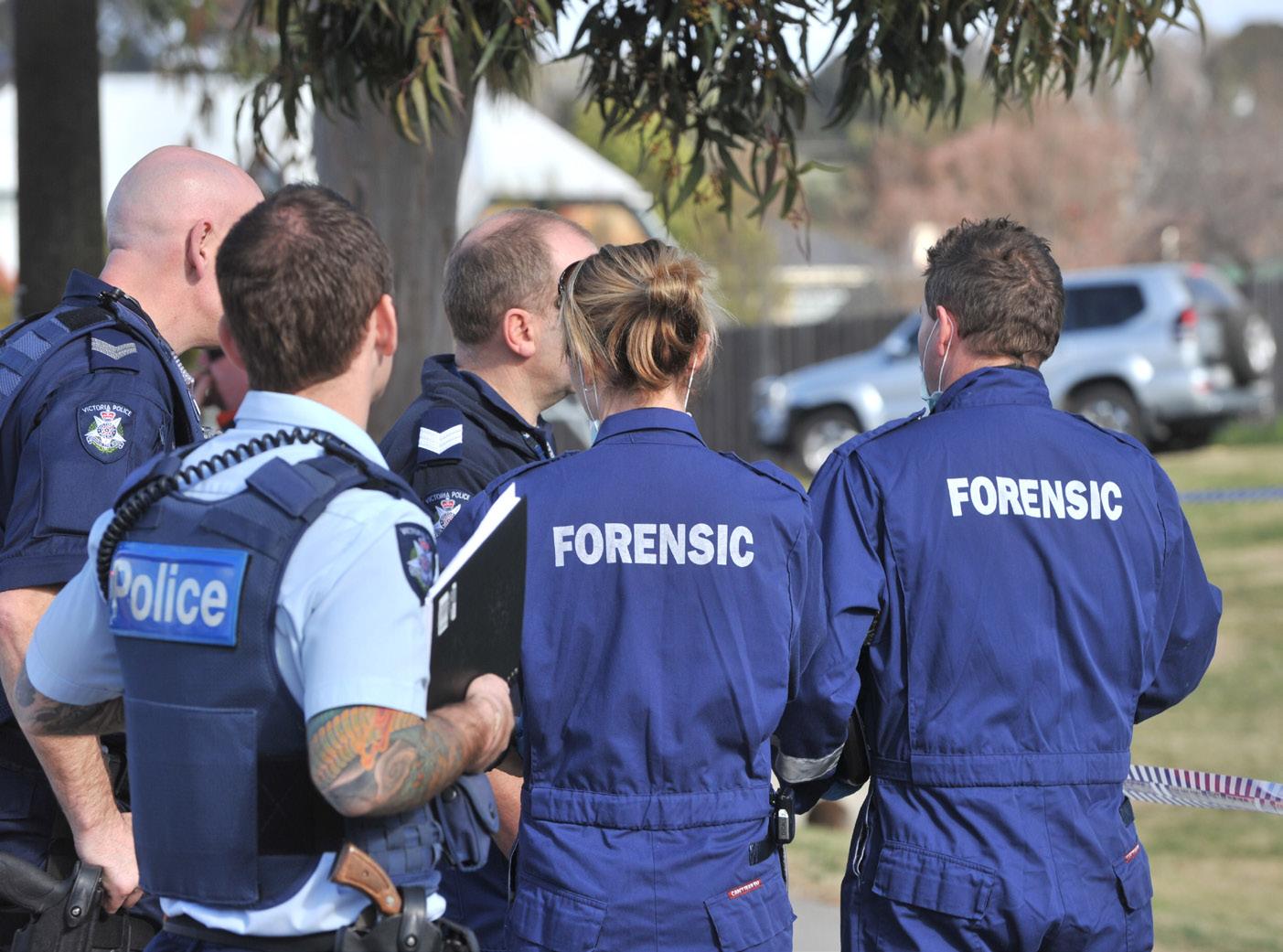
“I was driving back from Gisborne when they were doing the search and I got a call from one of the other detectives who said to me, ‘Harwood, are you sitting down? We just found Tisell’s wallet at Hicks’s house’,” Det A/Sen Sgt Harwood said.
“The hair was standing up on my arms.”
Major Crime Scene Unit officers were immediately called back to scour the house for further evidence.
Around this time, Det A/Sen Sgt Harwood heard back from Victoria Police’s Biological Sciences Group that Zayden’s DNA had been found on the set top box stolen from 15 Jackson Street, along with the DNA of one unknown person.
The blood stains found on Matthew Tisell’s pillow and clothing were also found to be his own.
Det A/Sen Sgt Harwood was reviewing photos of items seized during the second search of Hicks’s home when he spotted a long black baton within a bag of stolen property.
“The baton was a heavy bundle of copper wiring wrapped in black electrical tape,” he said.
“As soon as I saw the copper wire ends exposed at the end of the baton, I had a light bulb moment and I scrambled for the post-mortem photos of Zayden.
“There it was – the soft tissue stipple marks on Zayden’s face and body were almost identical to the pattern of the wires.”
The baton was rushed off for testing, which revealed the DNA of two people.
One was 1.1 trillion times more likely to be the DNA of baby Zayden than any
other Caucasian male from the Australian population. The other was 1100 times more likely to be the DNA of Harley Hicks.

“With that, I could finally rule out Matthew Tisell and Casey Veal as persons of interest, which was a big relief,” Det A/Sen Sgt Harwood said.
But it was quickly revealed to Det A/Sen Sgt Harwood that Harley Hicks had an identical twin called Ashley.
Identical twins with identical DNA.
“Not only did they have the same DNA, but they had the same traits, same drug addictions and very similar criminal records,” Det A/Sen Sgt Harwood said.
Ashley Hicks told police he was at his father’s house asleep on the night of Zayden’s murder, a claim that would need to be tested in court.
Harley Hicks was charged with murder and the case went to trial in March 2014. He fought the charge and his only defence was to try to pin the murder on his brother Ashley.
When a Victoria Police forensic officer conceded on the witness stand to the defence barrister that the DNA found on the baton was just as likely to be Ashley’s, Harley turned and winked at Det A/Sen Sgt Harwood from the dock.
It was the first sign of any emotion the remorseless Harley Hicks had shown through the trial.
‘I thought to myself, ‘Ok, game on’,” Det A/Sen Sgt Harwood said.
Among those Det A/Sen Sgt Harwood organised to put on the witness stand were Ashley himself and three others, who all gave evidence that Ashley was at his father’s house that night.
Casey Veal told the court that with Zayden’s horrific death, she lost everything.
“I lost all future plans I had dreamed for my boys. I lost his right to grow up, to celebrate even one birthday,” Casey said.
“All I have is memories and even most of them are tainted by this crime and the trauma that has come from this.
“This crime has destroyed my life; I will never be the same again.”
After five days of deliberation, the jury returned a guilty verdict.
Det A/Sen Sgt Harwood could not be in Bendigo for the verdict due to a family emergency in Melbourne.
Despite initially being a person of interest, Casey had nothing but praise for Det A/Sen Sgt Harwood and the relationship they had built.
Outside the court, she was asked her reaction to the guilty verdict.
“I only wish that Tony Harwood was here to see it,” she said.
In sentencing Harley Hicks, Justice Stephen Kaye described the murder as “appallingly violent” and “utterly evil”.
Hicks was sentenced to life in prison with a non-parole period of 32 years, a record sentence in Victoria at the time for such a young offender.
Images Path to justice
01 / 02 Specialist police comb Zayden's Long Gully home for evidence.
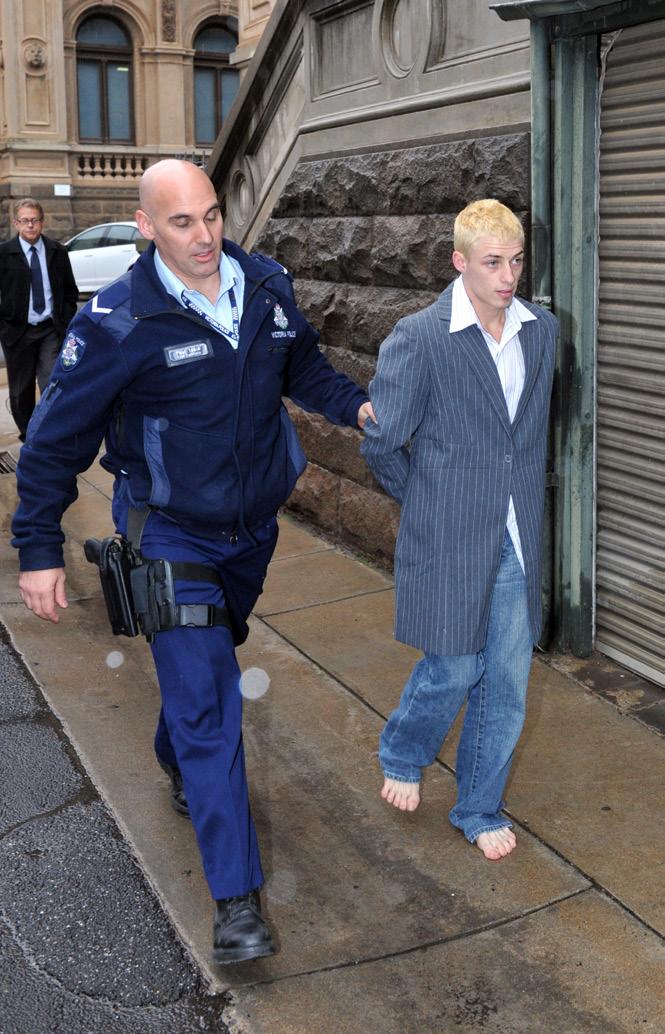
03 Harley Hicks was convicted of Zayden's murder.
Editorial: Jesse Wray-McCann
Photography: Jesse Wray-McCann, Bendigo Advertiser and supplied
02 03 19 POLICE LIFE | AUTUMN/WINTER 2023
STAYING COOL UNDER PRESSURE
A day in the life of a police officer is vastly different from one day to the next, but for alpine police, moving across snow presents an additional challenge.
It’s for this reason that each year, police officers from across Victoria’s alpine region undergo an intensive alpine skills training program, preparing them to work operationally at alpine resorts throughout the snow season.
Victoria Police has three seasonal snow stations – at Mt Hotham, Falls Creek and Mt Buller – which open on the King’s Birthday weekend and are staffed by local police 24-hours a day until late September.
Wangaratta Senior Sergeant Dan Hilton, who leads the training program at Falls Creek, said officers must learn to convert the basics of everyday policing into an alpine environment.
“It’s still policing – there’s still burglaries, assaults and public order issues,” Sen Sgt Hilton said.
“The spectrum of incidents is broad and mirrors what we see in other parts of the state, but the decisions we make before attending an incident are unique in alpine environments.”
The annual alpine skills training course covers an array of important snow skills, including navigation, four-wheel driving, and cold-climate and alpine awareness training.
An integral part of the program is learning how to operate a snowmobile which, according to Benalla Senior Constable Kiera Leach, who completed the training program in 2022, is harder than it looks.
“It’s a challenge trying to get your weight proportions in the different directions just to be able to manoeuvre the snowmobile,” Sen Const Leach said.
While learning how to operate a ‘ski-doo’ is a physical challenge, the theoretical side of the course is just as taxing.
“You’re concentrating so hard and trying to absorb all the information, because it’s very possible that you might have to use those skills,” Sen Const Leach said.
Victoria Police’s Search and Rescue Squad plays a key role in the course, preparing alpine police officers for challenging search and rescue situations.

Search and Rescue Senior Constable Michael Littleford said time is of the essence in snow
environments and alpine police officers need to know what actions to take in the first minutes and hours of a search and rescue situation.
“It’s pretty hard and the conditions vary a lot,” Sen Const Littleford said.
“There can be sunshine one minute then a whiteout, so while navigating and looking after yourself in those conditions is hard enough, looking after someone else is an extra challenge.”
Abundant snowfall and pent-up travel demand led to one of the busiest snow seasons in a decade across Victoria’s alpine resorts in 2022. As winter approaches, police are gearing up for another busy season in 2023.
“A lot of planning goes into staffing the seasonal stations and ensuring all members are fully trained,” Sen Sgt Hilton said.
“We hope we don’t need to use these skills, but if we do, we’ll be ready.”
Image Walking in a winter wonderland
Police officers undertake specialist alpine skills training to work at Victoria’s three seasonal snow stations from April to September.
Editorial and photography: Stephanie McLean
POLICE LIFE | AUTUMN/WINTER 2023 20
ALEXANDER GETTENS
Rank: Acting Sergeant
Graduated: May 2015
Station: Hamilton Police Station
Why did you join Victoria Police?
When I was 18, I started a Bachelor of Policing in New South Wales, but due to various family issues had to cease my studies. Six years, one wife and a child later, I was questioning what I wanted out of life and what my legacy was going to be. I thought back to my interest in crime statistics, criminology and law enforcement and decided to throw caution to the wind and apply to join Victoria Police.
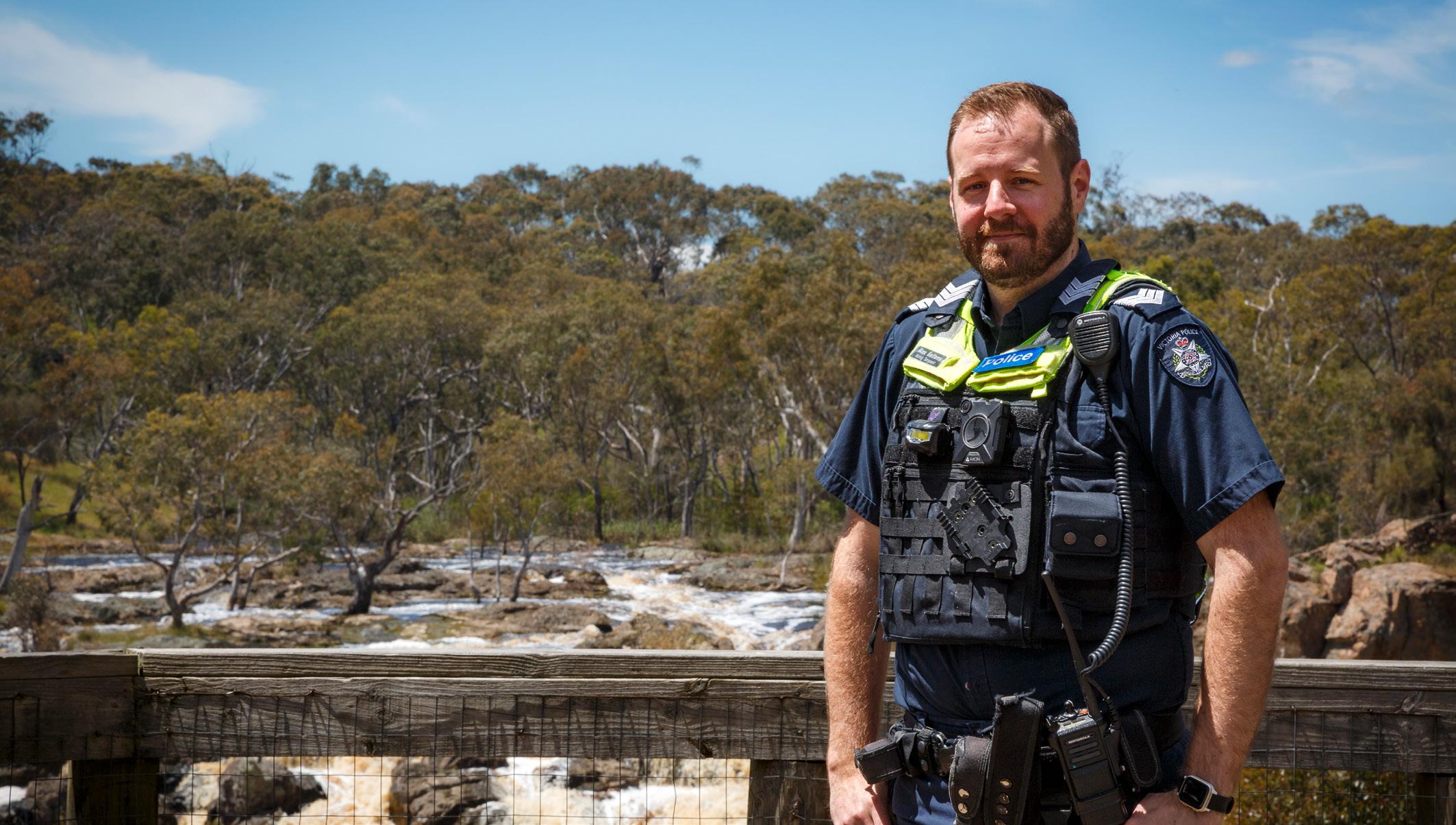
Tell us about your career history.
After completing my training and doing stints at Nunawading and Forest Hill, my squad was placed in the Transit area, working out of the Victoria Police Centre in Melbourne. While there I was able to hone my skills in talking to people and walking the beat, however I wanted to experience something different. After a long discussion with my wife, I decided to again throw caution to the wind and give Portland a try. I spent six years in Portland and moving there was one of the best decisions I’ve made in my life. Working here I was able to fully grasp policing holistically from report to court. After making senior constable rank, I was recognised by my peers as someone who may have a knack for sergeant work. So, to help further my career, I took another punt 100km from home to work at Hamilton Police Station, where I’ve been for about a year now.
What is it like working at Hamilton Police Station?
Different, but in a good way. Being in the heart of sheep country, we’re faced with crime and enforcement surrounding seasonal workers, farm crime and your general mishmash of local clientele. The big difference is that you get to know and understand the characters of your area. For instance, I can just say a name and everyone at the station instantly knows who I’m talking about. Another great part of the station is just how close everyone is. Even in my time here, I’ve got to know pretty much everyone at the station. From a light-hearted social atmosphere to knowing the guy next to you will have your back at the next job, there is something refreshing and calming about working rurally.
What is a career highlight that stands out for you?
A real stand-out for me was back in October 2022. Hamilton had missed the brunt of the soggy weather until one fateful Friday night when the heavens opened and down came what seemed like a year's worth of rain in just a matter of minutes. Suddenly we had about 40 jobs dropping onto our plate across every inch of Hamilton. With some quick and artful thinking, the crews involved were all able to rapidly triage the situation and drive out to the
most important sounding jobs first, working their way through them all and supporting each other brilliantly. Just a few hours later we were able to return to the station, boots and clothes soaked, but all satisfied that we did a damn fine job to keep our community safe. What is the biggest difference between policing in a regional area to policing in a metro area?
Rural policing has some challenges which I don’t think people in the more metro areas can truly appreciate. One of the biggest is resourcing. Most of the time it’s you as the sergeant, the van and the watch-house – that’s it for 100km. You can’t just wait for backup and sometimes it’s even a struggle to get onto anyone else because of how rural it is. One of the other things as a patrol supervisor is realising just how magnificently gigantic the area is – 12,871 square kilometres to be precise. This keeps you on your toes and you have to become somewhat of a magician to be able to solve all the issues in your area. That being said, the support of the 16-hour and one-member stations is absolutely fantastic –they are the lifeblood of those areas where we otherwise struggle to get to.
Editorial and photography: Danielle Ford
BEHIND THE BADGE 21 POLICE LIFE | AUTUMN/WINTER 2023
BITES ORGANISED CRIME VIPER
When hundreds of bikies rolled into Ballarat for a national ride, it wasn’t just local officers and Victoria Police’s dedicated outlaw motorcycle gang team, Echo Taskforce, waiting for them.

Also on the ground was the organisation’s newest tool in the fight against serious and organised crime – VIPER Taskforce.
The team of more than 80 members can be deployed anywhere in the state and provides support to specialist investigation units and regional police for investigation and enforcement purposes.
With Echo Taskforce intelligence indicating there would be about 350 bikies attending this particular national run late last year, VIPER was called upon to run a vehicle checkpoint, where every bikie taking part in the run would be
photographed and ID checked. Random drug and alcohol tests were also conducted.
With both investigative and tactical members in the taskforce, VIPER can step in and manage these checkpoints, allowing Echo Taskforce and local police in particular to keep resources focused on regular operations.
Detective Senior Sergeant Leigh Howse, who heads the investigative section of the VIPER Taskforce, said these checkpoint operations were a vital tool in the fight against organised crime.
“We provide security at the site and process each club member through the checkpoint, taking their photo and details,” Det Sen Sgt Howse said.
“This is an important intelligence-gathering exercise as we are able to get up-to-date
records of club members along with their addresses.”
The team's focus goes well beyond outlaw motorcycle gangs.
Since launching in July 2022, VIPER has made some serious waves to disrupt criminals committing serious and organised crimes. Detective Inspector Craig Darlow heads the taskforce – comprising police from a wide range of specialist roles – and said the team is in a unique position to target criminals from every possible angle.
“We’ve got members with backgrounds in financial crime, criminal proceeds, intelligence, road policing, tactical policing, family violence, drugs, firearms and more,” Det Insp Darlow said.
01
POLICE LIFE | AUTUMN/WINTER 2023 22
“We can draw upon all that specialist knowledge so that when we go after criminals, we can throw everything at them.”
The agile nature of VIPER is another strength according to Senior Sergeant Warren Chapman, who looks after the tactical side of the team.
In its first six months of operation, the taskforce was deployed to more than 40 regional jobs across the state.
“We’ve been able to switch to a more proactive policing approach, with a lot of our work being around enforcement powers, as opposed to being reactive and waiting for something to happen,” Sen Sgt Chapman said.
“Regions and other crime units will come to us when they have an area or crime theme they need assistance with.
“From road policing enforcement to serving Firearm Prohibition Orders (FPOs) and conducting compliance checks, we can saturate the area and make a hostile environment for criminals to operate in.
“Not only does this take pressure off local resources, but it also helps them in the future through the intelligence we gather and provide them with during these targeted operations.”
Det Sen Sgt Howse reinforced the impact these targeted operations were having on organised crime groups.
“We’ve processed 159 offenders for charges ranging from assault to deception, drugs
trafficking and possession, handling stolen goods, theft of motor vehicles, right through to weapons, explosives and firearm possession,” he said.
“We’ve got a wide range of legislation at our disposal that we can use to target these individuals from any and all angles.
“The results speak for themselves.”
In addition to FPOs, the taskforce can also use search powers under the Drugs, Poisons and Controlled Substances Act, apply for search warrants in short periods, use warrants under the Firearms Act and enforce bail conditions.
VIPER also creates headaches for criminals by targeting them for road policing offences, no matter how minor.
In its first six months, VIPER arrested 242 people and charged 159 of them with 564 offences.
Also in this period, the team seized 33 firearms, more than $990,000 in cash and impounded 42 vehicles.
These are figures that Det Insp Darlow said bikies and heads of criminal groups are taking notice of.
“We’ve had reports from members that when they attend jobs the offenders will comment ‘Oh you’re that VIPER team aren’t you?’,” Det Insp Darlow said.
“There’s almost an expectation in these organised crime groups now that if they’re
subject to some sort of enforcement action, they’re going to get a visit from the VIPER Taskforce.
“We served 33 FPOs in six months (to January this year) and because of this, a lot of our higher profile criminals are not carrying firearms because they are aware that we could potentially turn up at any time.”
Det Insp Darlow said the taskforce will continue to create a harsh environment for criminals and will continue to dish out punishment for everything from not wearing a seatbelt to carrying loaded handguns.
“We want to make a hostile environment for these serious and organised crime groups, to disrupt and dismantle them,” he said.
“Organised crime syndicates are ruthless and relentless and we will continue to be the same in policing them so that we can reduce crime overall and make our community safe.”
Images Revving up police response 01 / 02 / 03 Members from the VIPER Taskforce were out in force at a recent national bikie run in Ballarat to provide support to regional and specialist police.

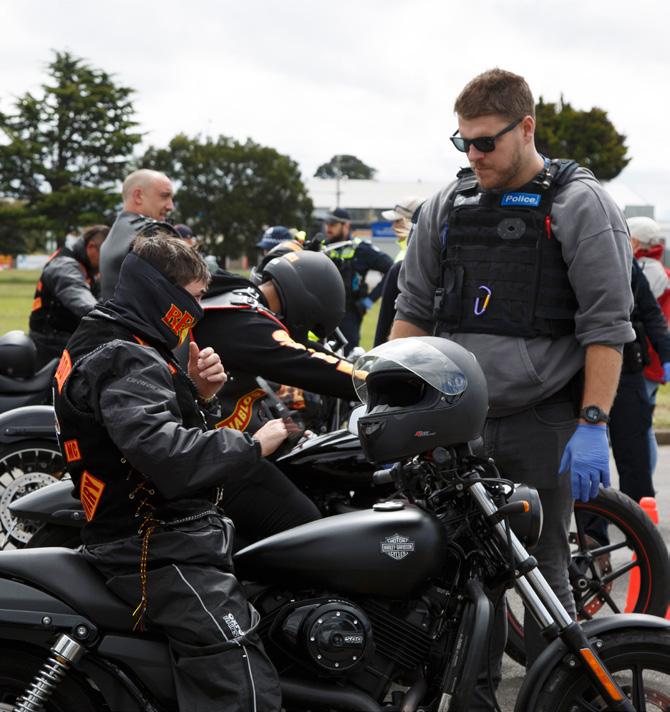
04 The VIPER Taskforce management team (from left) Det Insp Craig Darlow, Det Sen Sgt Mick Dwyer, Det Sen Sgt Warren Chapman and Det Sen Sgt Leigh Howse.
Editorial and photography: Danielle Ford
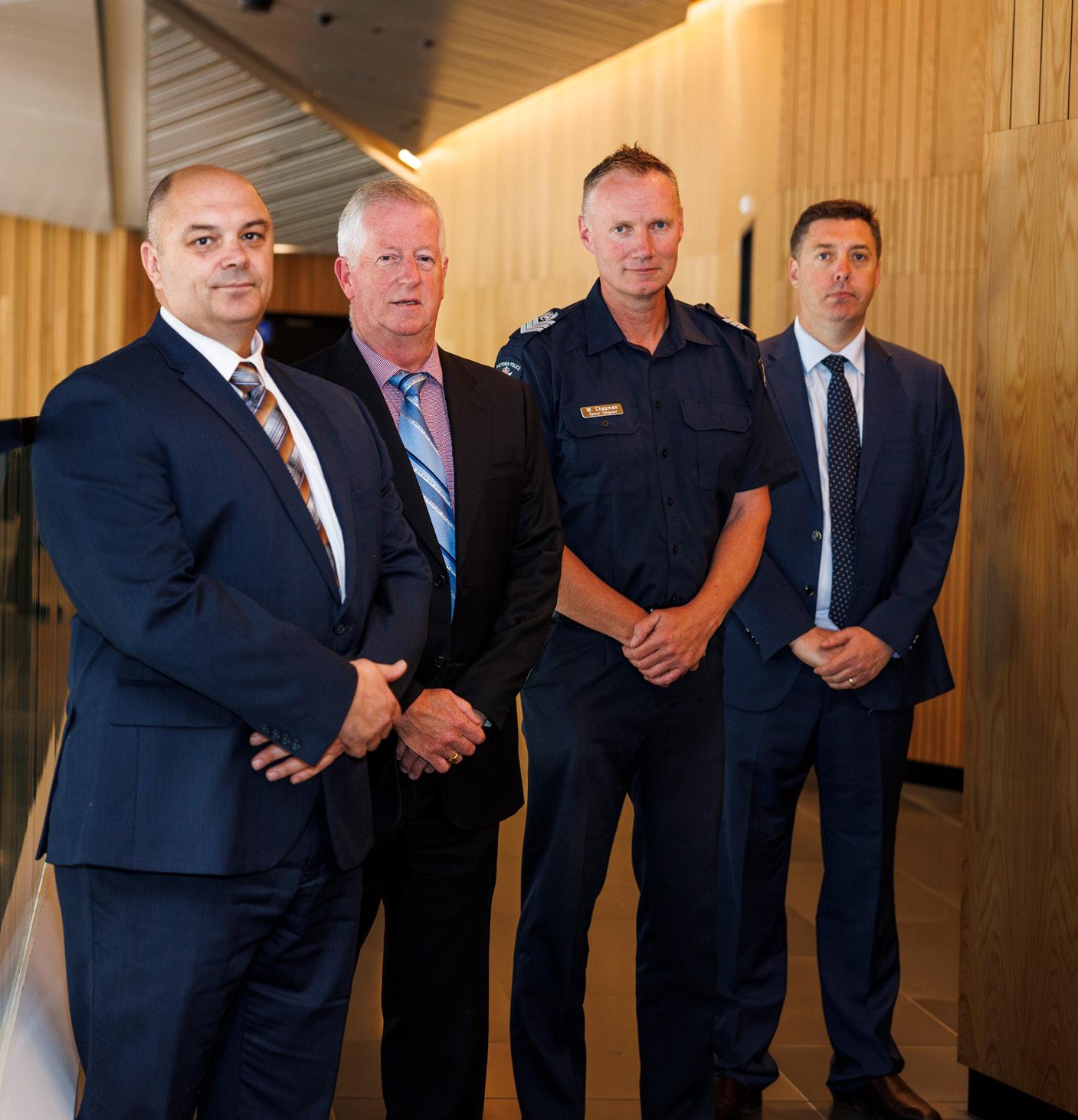
04 02 03 23 POLICE LIFE | AUTUMN/WINTER 2023
A FAIR EFFORT

POLICE LIFE | AUTUMN/WINTER 2023 24 CAREER IN FOCUS
It’s no surprise Commander Debra Robertson chose a career in policing – the core values she has carried through her life always pointed in that direction.
“It’s a bit clichéd, but I just don’t like unfairness. That sense of being anchored to what’s fair and what’s not has always been my motivation and driver,” Cmdr Robertson said.
With grand ambitions to pursue justice and fairness in the police force, Cmdr Robertson finished school in the early 1980s and took up studies in nursing to bide her time until she reached the minimum entry age of 20 years for female recruits at the time.
Nearly two years into her nursing studies, Cmdr Robertson got the news she’d been waiting for: the force’s minimum entry age for women had been lowered.
“As soon as they dropped the age, I put my application in and never looked back,” she said. Cmdr Robertson’s policing career began in 1983 with stints in busy Fitzroy and Brunswick. She then qualified as a detective, which opened the door to some of her most rewarding work.
“As a young detective, getting my hands on long-standing sex crime matters and being able to bring them to resolution, there was a great deal of satisfaction in holding those offenders to account,” she said.
“I vividly remember a case I worked on for two years, which turned out to be quite a nasty incest matter that was 30 years old.
“To be involved in the unravelling of that and holding somebody to account for their terrible behaviour was really satisfying.”
As she progressed through her years as a detective while concurrently starting a family, Cmdr Robertson found herself juggling work and home life.
While part-time work is a key pillar of employment flexibility and commonplace across Victoria Police in 2023, this wasn’t the case 25 years ago when Cmdr Robertson sought to reduce her working week by one day to spend more time with her young family.
At that time, detectives were considered ineligible for part-time arrangements and her application was declined.
Firm in her belief that detective work and spending more time with family were not mutually exclusive, Cmdr Robertson fought tirelessly for detectives to be eligible for parttime work.
Cmdr Robertson recalls this period of her career as challenging, but she had the ultimate drive to keep going.
“During that time, my daughter came home from kindergarten with a family portrait she’d drawn, and I wasn’t in it,” she said.
“I asked her, ‘where’s Mummy?’, and she replied, ‘Mummy’s at work’.
“That really motivated me to keep going, to make sure I wasn’t missing from my picture.”
Cmdr Robertson’s determination resulted in part-time employment for detectives becoming commonplace for both men and women across Victoria Police.
Her relentless advocacy for equality saw Cmdr Robertson inducted into the prestigious Victorian Honour Roll of Women in 2022.
Another pivotal moment for Cmdr Robertson came when she was a newly promoted inspector in the Darebin Police Service Area. A youth resource officer invited her to a Friday night event in the area hosted by Blue Light Victoria.
Blue Light was formed by police in Melbourne’s east in 1976, starting as a drug and alcoholfree disco supervised by police and growing exponentially into a proactive engagement program for young people across the state. Attending the local event in 2011 sparked a sense of duty for Cmdr Robertson.
“It was such a powerful experience to see kids conversing with police in a non-confrontational way. I saw the trust building over time, I saw the sad bit where there were kids left behind by their parents that night and I saw the members on the van showing compassion to those kids and getting them home safely.
“I could see these kids deserved a fair go and I said to my colleague who invited me that night, ‘tell me how I can help’.”
That evening put Cmdr Robertson on a path to begin her 11-year tenure as president of Blue Light until the end of 2022. Among the notfor-profit organisation’s many activities, Blue Light has delivered hundreds of programs in primary and secondary schools at which police engage with students about youth-centric topics such as sexting, drug and alcohol use and family violence.
Cmdr Robertson said the young participants weren’t the only people to benefit from Blue Light’s school-based programs.
“It’s been great to see schools report less truancy on the days our programs are running, but another interesting thing that’s fallen out
of this has been the value our police members have gotten from a mental health perspective,” she said.
In her working life, Cmdr Robertson has risen through the ranks of Victoria Police, fuelled by her passion for gaining wideranging experience across many areas of the organisation, including professional standards; transit and public safety; road policing; organised crime; Western Region and now in her current role within Intelligence and Covert Support Command, a position she’s held since mid-2022.
The pursuit of ‘different’ is a common thread in Cmdr Robertson’s career and is evident in her varied work history.
“I count myself pretty lucky to have had the experiences I’ve had along the journey, even when they’ve been unfamiliar or out of my comfort zone at first,” she said.
“One of the things I’ve always tried to do in my career is to get comfortable being uncomfortable. As soon as I started feeling too comfortable in a role, I knew it was time to move on to the next and I really believe that’s where growth comes from.”
While her roles and areas of expertise have evolved throughout her four decades of dedicated policing service, Cmdr Robertson’s overarching ethos has remained solid.
“My approach is pretty simple, and that’s to do my job well and look after each other.
“The community is served better if you’re happy doing what you’re doing, and that’s what this job is all about.”
Images Up for the challenge
Cmdr Debra Robertson has actively sought out new and unfamiliar experiences in her 40 years with Victoria Police, including a stint in road policing.

Editorial: Cassandra Stanghi
Photography: Supplied
25 POLICE LIFE | AUTUMN/WINTER 2023
SUPPORT AFTER THE SCENE
For most passers-by, the scene of a serious road collision is a sad sight quickly forgotten after driving past the flashing lights of emergency services.
But for the Major Collision Investigation Unit (MCIU), the scene is the beginning of a months-long process to hold offending drivers to account and provide a degree of closure to victims of road trauma.
The specialised unit of 48 detectives investigate fatal and serious injury collisions under many circumstances, including those involving criminal negligence by a surviving driver. It’s a unit nobody wants to be busy, but having attended 156 collisions in 2022 alone, the MCIU sadly has no shortage of work.

Investigations can be lengthy, and while collating a strong brief of evidence to be used for successful prosecution in court is a key part of the unit’s role, MCIU members go far beyond their technical skillsets to provide support for the families of victims.
MCIU detectives act as the primary police contact point for families throughout investigations and ensure they are well supported and informed. Formally, this includes important referrals to support services and resources, but according to Detective Leading Senior Constable Kelly Carvill, the most powerful support provided often isn’t bound by formalities.
“From our initial contact on the phone with a bereaved loved one, to the first meet-and-greet
with a family and all the way through the investigation, we’re very focused on keeping them involved and giving them opportunities to ask questions that might help them come to terms with what’s happened,” Det Ldg Sen Const Carvill said.
In her 11 years of working in the MCIU, Det Ldg Sen Const Carvill has led investigations for countless tragic collisions, but some stand out more than others.
In January 2020, she was assigned to a job where two firefighters driving back to their depot during the 2019/20 Victorian bushfires came head-to-head with another car driving on the incorrect shoulder of the road. The two vehicles collided and firefighter Mat Kavanagh,
POLICE LIFE | AUTUMN/WINTER 2023 26
a young father, was tragically killed while his colleague John Martin suffered injuries.
When reflecting on the investigation, Det Ldg Sen Const Carvill was eager to highlight a heartfelt initiative from her colleague Detective Leading Senior Constable Steve Mottram, who spent nine hours at the scene in Victoria’s north-east.
Det Ldg Sen Const Mottram spent a lot of time with both the Kavanagh and Martin families in the days following the collision, including with their young children.
“I thought about what I could do to try to help the children through this process as, within a day, police were at their houses, one of their fathers wasn’t there anymore and the other was trying to put on a brave face after losing his colleague,” Det Ldg Sen Const Mottram said.
“I wanted to give each of the children something that might bring them some comfort, something to hug at night when they may be missing their father.”
Det Ldg Sen Const Mottram and the Blue Ribbon Foundation arranged a plush police puppy toy for each of the children, a heartfelt gesture which didn’t go unnoticed by the families.
“I feel very strongly about trying to help people through the most difficult times and, in particular, I feel for the children as they are sometimes too young to understand what’s going on,” he said.
For Detective Senior Constable David Swankie, a keen interest in road policing and a desire to influence positive change on Victorian roads attracted him to join the MCIU in June 2020.

A year after joining the unit, Det Sen Const Swankie was assigned to a job with unthinkably heartbreaking circumstances, requiring great care in both investigating the collision and supporting a grief-stricken family – the death of a teenage boy on his 16th birthday.
Lachlan McLaren was walking his girlfriend home in Mentone when an out-of-control vehicle struck and immediately killed him. His final act is believed to be pushing his girlfriend out of harm’s way.
Despite the cause of the collision being clear, an extensive investigation was needed to ensure enough evidence was presented in court to hold the offending driver to account.
“The driver displayed behaviours consistent with drug use at the scene and many witnesses observed his erratic driving immediately prior to the collision,” Det Sen Const Swankie said.
“It was pretty clear from that initial stage that impairment was going to be a factor.”
Beyond examining photos and videos of the scene, body-worn camera footage of first responders, witness statements and determinations from forensic experts, the
investigation also involved examining the driver’s mobile phone usage data to build a fatigue timeline.
“We found there was only a four-hour period in the three days leading up to the collision where he could have slept for more than 15 minutes,” Det Sen Const Swankie said.
This sleep deprivation combined with the methamphetamine and cannabis found in the driver’s system painted a clear picture of how the speeding and unlicensed driver was able to cause a tragic outcome.
During the investigation, Det Sen Const Swankie built a strong relationship with Lachlan’s family through transparent conversations and lending a listening ear.
“I’m always very honest with families that I’ve never been in their situation, but by listening to them and reassuring them that I’m going to do everything I can to get them some answers, it goes a long way in creating a good relationship,” he said Just over 12 months after the collision that took Lachlan’s life, the offending driver was sentenced to a record 15 years behind bars. While the significant sentence was pleasing for the McLaren family, Det Sen Const Swankie knows complete closure is difficult to achieve when a loved one is lost suddenly.
“We often say to families that a sentence is just a number and we all know that no sentence will bring someone’s loved one back,” he said.
For MCIU detectives, the confronting nature of their investigative work and their dedication to supporting distraught loved ones can be emotionally taxing. The unit takes its commitment to protecting the wellbeing of its members seriously, with police psychologists and chaplains readily available whenever they need support.
“We see some terrible things that no amount of training can prepare you for, but our office has done a fantastic job to protect our mental health over the last few years by giving us great access to support and minimising the traumatic things we’re exposed to where possible,” Det Ldg Sen Const Carvill said.
Despite the difficult circumstances the unit deals with every day, MCIU detectives share a strong sense of camaraderie built upon the rewarding work they do.
“Everybody in the unit is really supportive and we look out for each other because we all know what we’re dealing with,” Det Sen Const Swankie said.
For Det Ldg Sen Const Carvill, it’s this sense of unity and the feeling of making a difference that has kept her interest in the unit alive for more than a decade of working there.
“I remember being a recruit at the Academy 17 years ago and MCIU presented a lecture which really inspired me to work hard to get into the unit,” she said.
“Now all of these years later, I really do believe this is the best job in Victoria Police.”
Image Long road ahead
01 For MCIU members like Det Ldg Sen Const Steve Mottram, setting up sophisticated scene-examining equipment is just the beginning of a complex journey to case closure.
Editorial: Cassandra Stanghi
Photography: Jesse Wray-McCann
“EVERYBODY IN THE UNIT IS REALLY SUPPORTIVE AND WE LOOK OUT FOR EACH OTHER BECAUSE WE ALL KNOW WHAT WE’RE DEALING WITH.”
01 27 POLICE LIFE | AUTUMN/WINTER 2023
CAUGHT ON CAMERA
Connect with us
Follow Victoria Police on Facebook by visiting facebook.com/victoriapolice


Follow Victoria Police on Instagram at instagram.com/victoriapolice





Follow Victoria Police on LinkedIn by visiting linkedin.com/company/ victoriapolice
Follow Victoria Police on Twitter at twitter.com/victoriapolice
Kicking goals: Deputy Commissioner Neil Paterson and Assistant Commissioner Glenn Weir presenting the 2022 Pride Cup to Victoria Police Soccer Club’s Sergeant Gurkarnvir Singh and Senior Constable Brittany Smith.
Somewhere under the rainbow: Air Wing helicopter PolAir30 at Essendon Fields Airport.
Show of support: Victoria Police Pipe Band members Alexis Ferguson and Jamie Hawke lead the crowd at the Walk Against Family Violence in Melbourne.
Safety first: Leading senior constables Kev Bridle, Samara Jones and Rachel Cooke shared crime prevention tips at the Westfield Knox Emergency Services Expo.
Best in show: Sergeant Sensible and Detective Senior Sergeant Stephen Pucar helped local kids become Junior Detectives at the Royal Geelong Show.
Making tracks: Sergeant Louis Du Plessis, Senior Constable Paul Nichols and First Constable Matt Canaqali patrolling along the Yarra River.
POLICE LIFE | AUTUMN/WINTER 2023 28
Opening doors: Victoria Police Diversity Recruitment Program participants getting first-hand insight into road policing operations.
Immersive training evolves
Counter terrorism experts have gathered at the Victoria Police Academy for a virtual training scenario based around a bomb scene examination.
Not only has the exercise brought together specialists from across Victoria Police, but thanks to the organisation’s new, state-of-theart immersive learning system, they are linked in with their counterparts from other jurisdictions around Australia and New Zealand.
Acting Inspector Chris Price of Victoria Police’s Simulated and Immersive Learning Unit said the Australia-New Zealand Counter-Terrorism Committee’s real-time exercise was just the beginning of what is possible with the Avalanche TTX (tabletop exercise) system.
“The exercise was run from Queensland, but they had participants from all around Australia taking part in it all at the same time,” A/Insp Price said.
“We hosted the Victorian contingent here at the Academy and we had arson chemists, bomb techs, bomb scene examiners and more.
“The new immersive learning system really opens us up to not only connect with other police jurisdictions across Australia, but globally as well for joint-agency exercises, because a lot of organisations around the world use it.”

Avalanche TTX has replaced the long-serving Hydra as Victoria Police’s primary system for delivering immersive, discussion-style exercises to recruits, police, protective services officers, police custody officers and Victorian Public Service employees.
The multi-room audio-visual system is used to train and test participants’ decision making by immersing them in a scenario through videos, audio clips, paper documents and role playing. Some of the exercises for which the system is used include scenarios for active shooters, hostage incidents, vehicle pursuits and bushfires.
The system facilitators can speed up or slow down each exercise to customise the training experience.
People Development Command Assistant Commissioner Kevin Casey said the primary Avalanche TTX facility is based at the Academy but, for the first time, this kind of immersive learning will be available in country areas.
“Regional members will also benefit from the portable kits, with the same immersive learning opportunities now available without travel to Melbourne,” AC Casey said.
“This is important because it means we are
continuing to enhance the ongoing training of our regional members but they can spend more time in their communities on the frontline without the need to travel to Melbourne.
“It’s real-world training without real-world consequences, and it prepares our members for emergencies and critical incidents when effective decision making is crucial.”
A/Insp Price said the new immersive learning system is the product of an Australian company, which has presented many benefits.
“We’re finding that we're getting really quick and constant updates from the provider to improve and tailor the system for our specific needs here at Victoria Police,” he said.
Image Learning on the job
The new immersive learning system means members can train for real-world scenarios without real-world consequences.
Editorial and photography: Jesse Wray-McCann
29 POLICE LIFE | AUTUMN/WINTER 2023
UPH LDING THE LAWS (OF CRICKET)
When Senior Sergeant Phil Gillespie umpires international cricket matches and things in the middle start getting a little testy, the players sometimes joke that he’ll break out the capsicum spray.
“A lot of them know my background as a police officer, so they’ll comment out on the ground, saying, ‘You’re not going to get anything over this guy, he’s a cop and he's dealt with a lot worse than this’,” Sen Sgt Gillespie said. The police officer of 25 years has been a cricket umpire since 2009, after a succession of major injuries brought an end to his time playing the sport at an amateur level.
“I think my wife, who is a police officer as well, was getting fed up having to both look after our kids and babysit me as well, so it was time to stop playing,” he said.
He planned to get into coaching and, while attending classes on the laws of the game, was persuaded to go down the umpiring path.
Sen Sgt Gillespie quickly learned how well his training, skills and experience as a police officer had set him up for not only enforcing the rule of law, but the rules of cricket as well.
“In the police, they teach you a lot of people skills, and policing is pretty much sink or swim in that department,” he said.
“And in umpiring, one of the most important aspects of what we do is what we call player management or match management, and that’s all about people skills and communication skills.
“As police, we are very good at moving between different communication styles depending on the situation.
“During a match, we umpires need to be able to use two-way communication to listen well and help diffuse any situations, but if it’s beyond that point, you stick to your one-way communication and deal with the conflict that way.”
After years of umpiring at a national level, Sen Sgt Gillespie made his international debut last October in a T20 match between Australia and the West Indies at the Gabba in Brisbane.

It was a hugely proud moment for a man who was originally happy just to umpire fourth grade in Victorian Premier Cricket, but who has now also umpired further international matches, two Big Bash League finals and at the MCG in front of a crowd of 75,000.
Sen Sgt Gillespie said the biggest reason for his progression through the levels was the support of his family and Victoria Police colleagues.
“My wife and two daughters are always cheering me on and came to my first international match
in Brisbane, and it’s great to be able to share that with them,” he said.
“I've got a really supportive office at Victoria Police.
“I’ll be forever grateful to my bosses and my four sergeants who cover the load while I’m away because I simply could not do it without them.” Not only do his work mates offer their support for his umpiring, but their feedback as well.
“They often watch my matches because I think they’re hoping they can give me a bit of a bit of stick for any bad decisions,” Sen Sgt Gillespie said.
“Sometimes I get back into the office the day after a match and they say, ‘Hey, by the way, how's that decision going for you?’.”
Image Decisions, decisions
Senior
Phil
Editorial: Jesse Wray-McCann
Photography: Supplied
Sergeant
Gillespie (left) made his international umpiring debut at the Gabba last year.
POLICE LIFE | AUTUMN/WINTER 2023 30
NATIONAL FOCUS TO DRIVE DOWN CRIME SUPPORTING VICTORIANS WITH DISABILITY
Cybercrime, illicit firearms and outlaw motorcycle gangs were hot topics at a Serious and Organised Crime Coordination Committee (SOCCC) meeting held in Melbourne late last year.
Comprising leaders from every Australian state and territory policing jurisdiction, as well as Australian Federal Police, Australian Criminal Intelligence Commission, Australian Tax Office, AUSTRAC, Australian Border Force and New Zealand Police, the SOCCC brings together capability and expertise to combat high-level crimes.

Victoria Police Crime Command Assistant Commissioner Robert Hill said close collaboration with state and federal partners is becoming increasingly important.
“The transnational nature of serious and organised crime – enabled through the new and emerging technology used by criminals –has challenged the traditional investigative practices across our organisations,” AC Hill said.
“Crime does not respect state, national or international borders, so it requires a collective focus of our efforts to combat it.”
The SOCCC’s collaborative effort has proven valuable in recent years, helping to reduce the threat of outlaw motorcycle gangs, disrupt the manufacture, trafficking and use of illicit firearms and drugs and remove children from sexual or physical harm.
WELCOME BACK, COPPER
The old adage of absence making the heart grow fonder is about to be put to the test with the trial of a new process for the reappointment of former police members to the rank of sergeant and senior sergeant.
Human Resources Command Assistant Commissioner Luke Cornelius said the new process will make it easier for former police to return to the fold at sub-officer rank.
“It is hoped this new path will encourage those with years of policing and business experience to reconsider their employment opportunities,” he said.
The sun shone brightly as police took to the streets of Melbourne as part of the 2022 Law Enforcement Torch Run late last year.
In celebration of International Day of People with Disability, the annual torch run raises awareness of, and funds for, Special Olympics programs, with more than 1.9 million athletes participating in 35 countries.

Since 2008, Victoria Police members have raised more than $900,000 for Special Olympics Victoria, which aims to build a sense of community by providing opportunities for inclusion and supporting people with intellectual disability.
Chief Commissioner Shane Patton joined Victoria Police members, Special Olympics athletes and supporters on the 2022 walk and presented a cheque for more than $230,000 to Special Olympics Victoria.
In the same week, Victoria Police employee Natale Cutri was honoured at the Victorian Public Sector Enabler Awards with the ‘Change Maker’ Award for Outstanding Achievement by an Individual.
The judges were impressed by Mr Cutri's outstanding advocacy for accessibility and his drive to create change, through his roles as co-chair of the Victoria Police Enablers Network and treasurer of the Victorian Public Sector Enablers Network.
Successful applicants will be reappointed to a temporary position as a general duties sergeant or senior sergeant in the CBD and will have up to two years to secure a permanent position anywhere across the organisation.
AC Cornelius said the trial will allow Victoria Police to welcome back people “who have a proven strong record of policing with the added benefit of experience gained from working in other organisations”.
The program is open to former members of ranks from senior constable to senior sergeant.
For more information, visit police.vic.gov.au
IN BRIEF PROACTIVE POLICING STORIES
police.vic.gov.au/news
31 POLICE LIFE | AUTUMN/WINTER 2023
SCAN
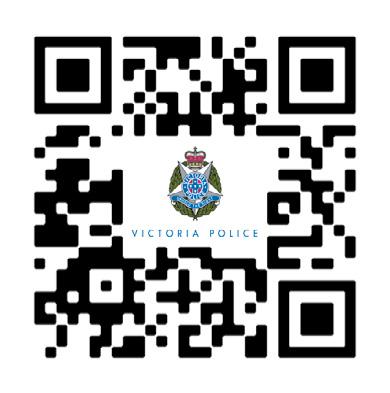
Victoria Police is made for ambitious people looking for a career with more challenges, excitement, purpose and possibilities.
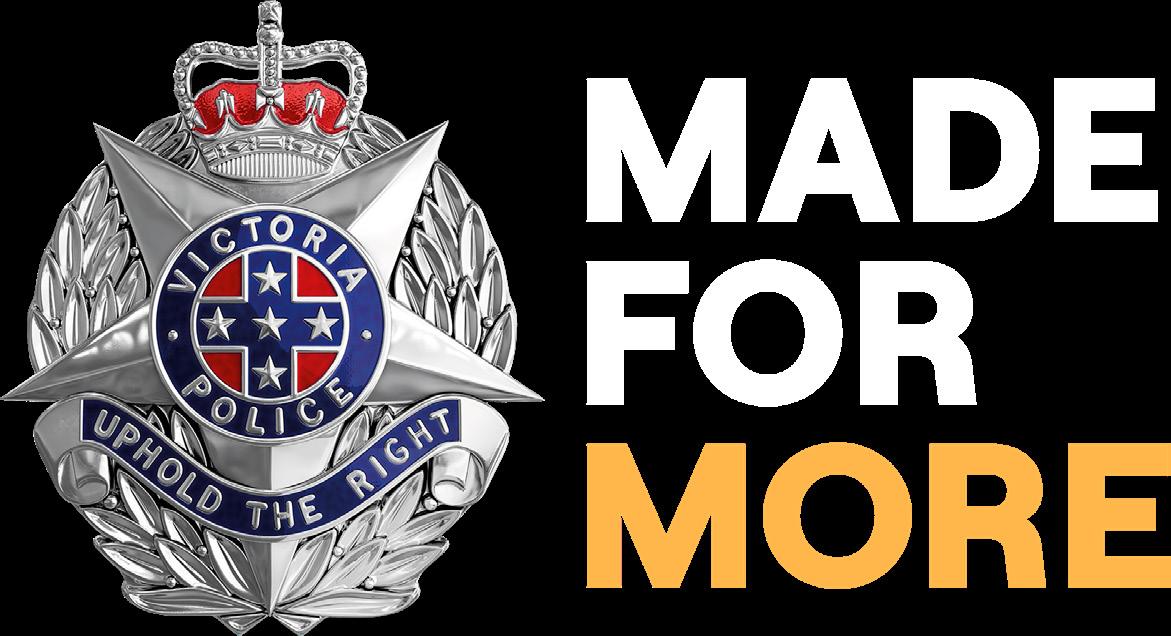
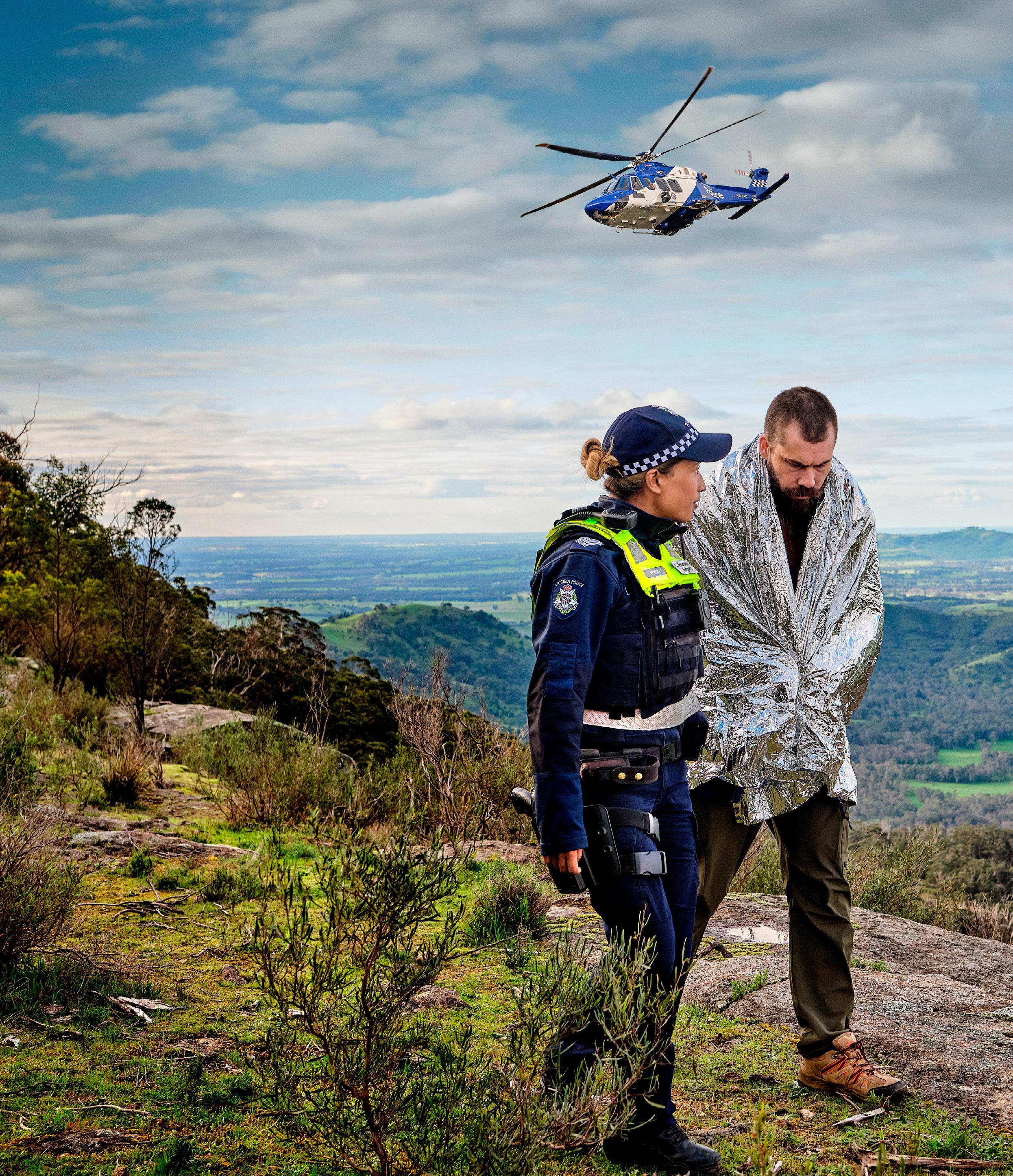
police careers HERE























































































